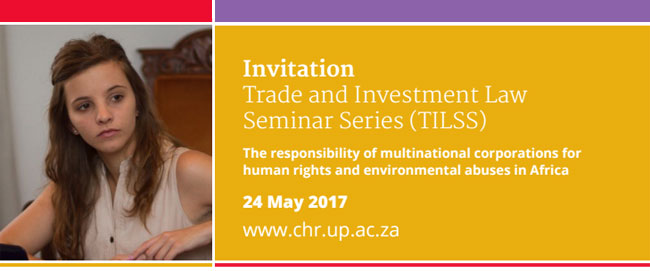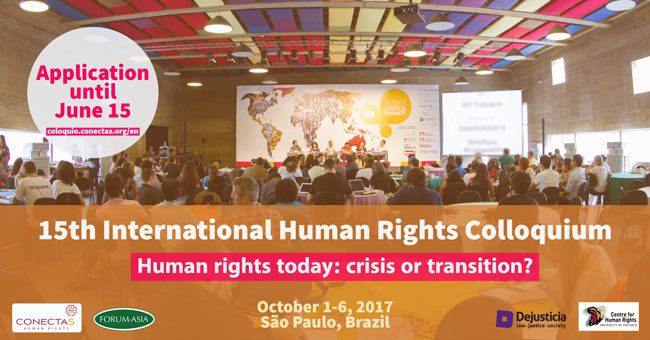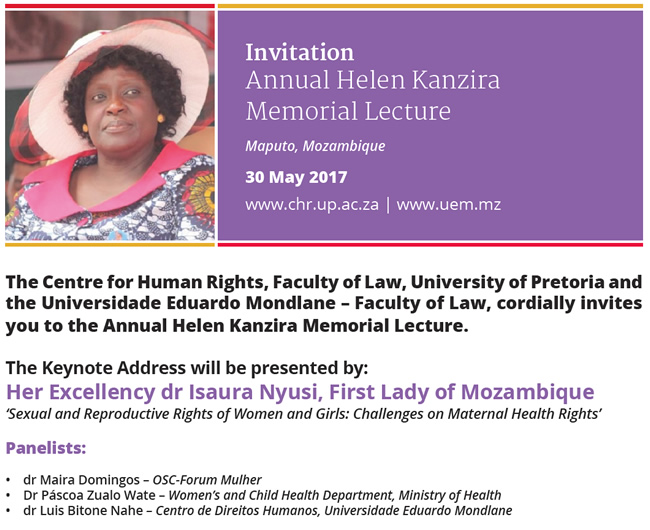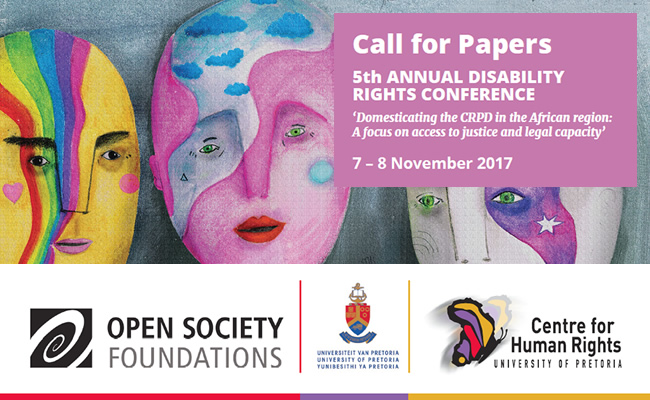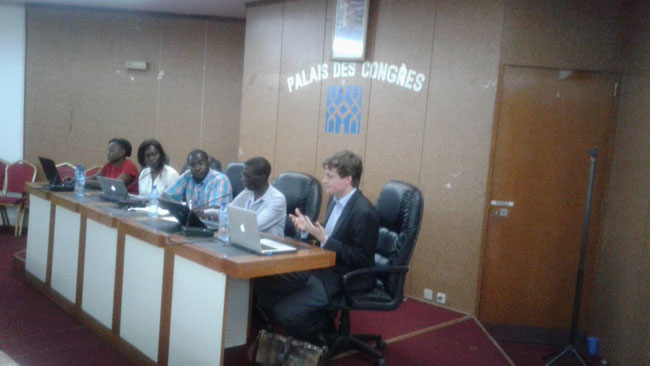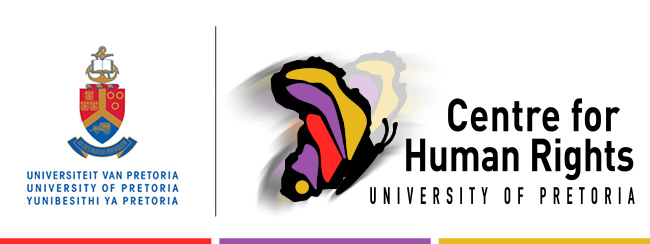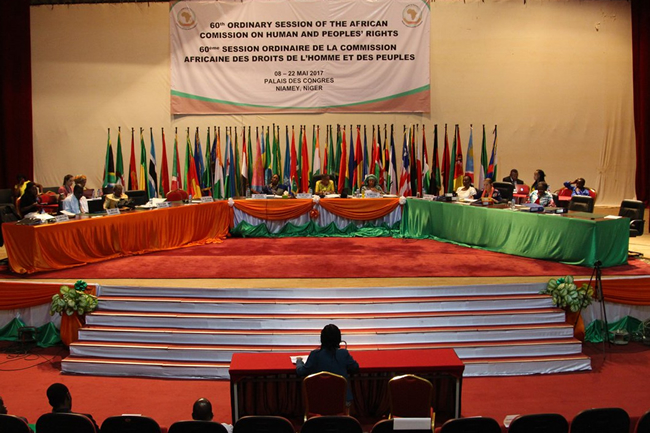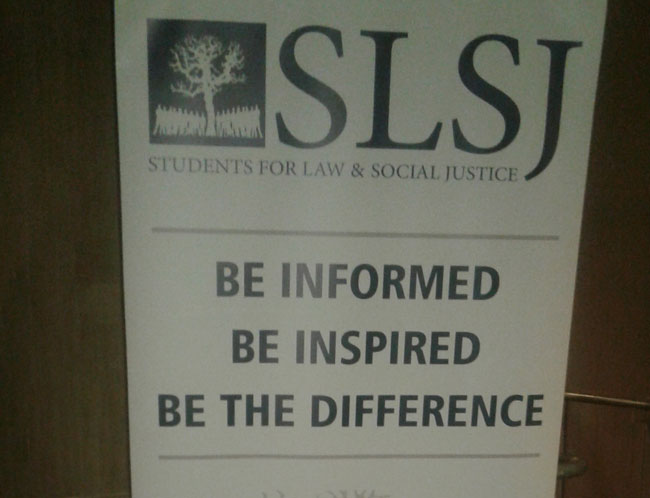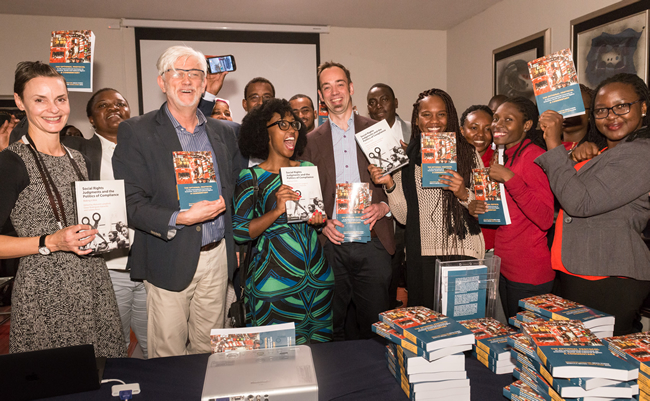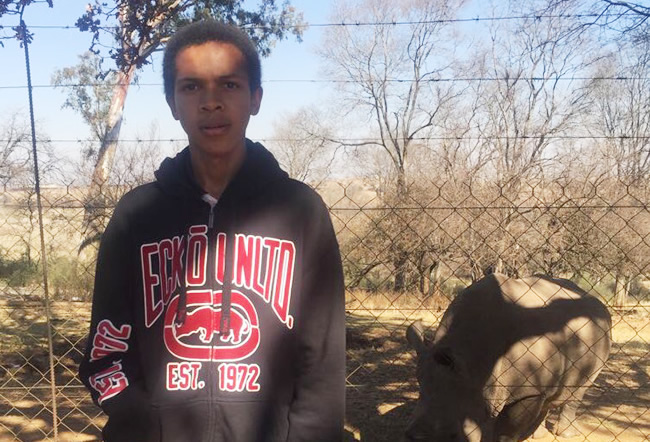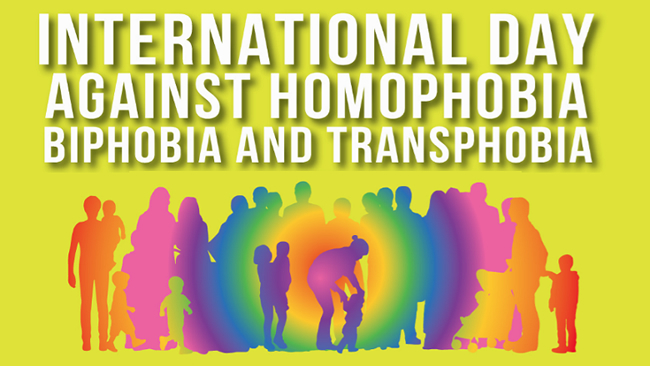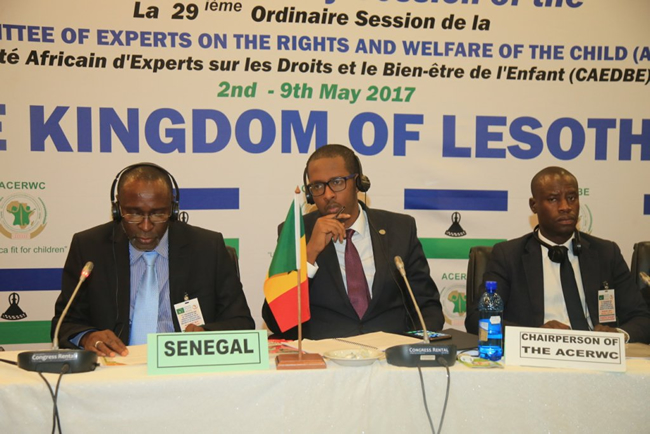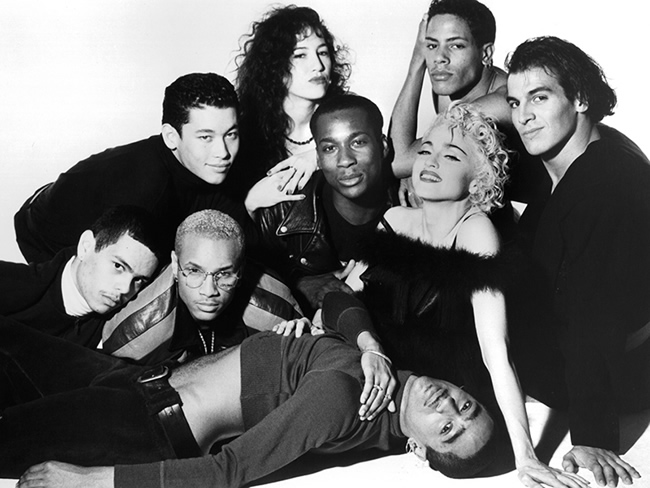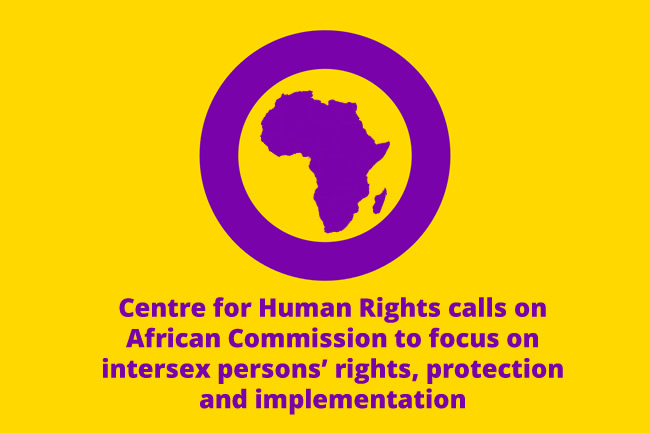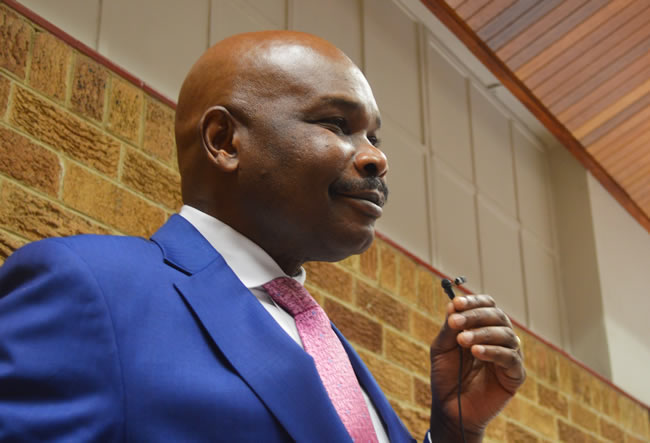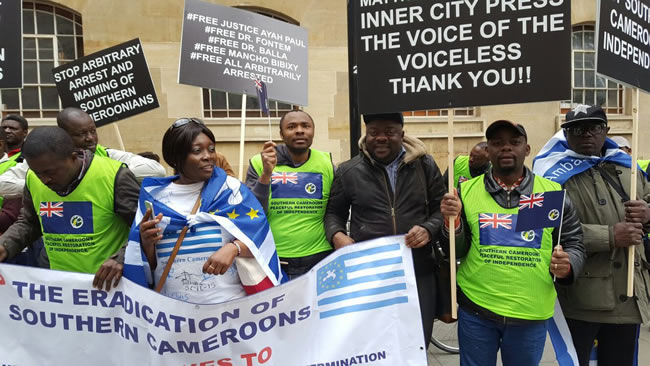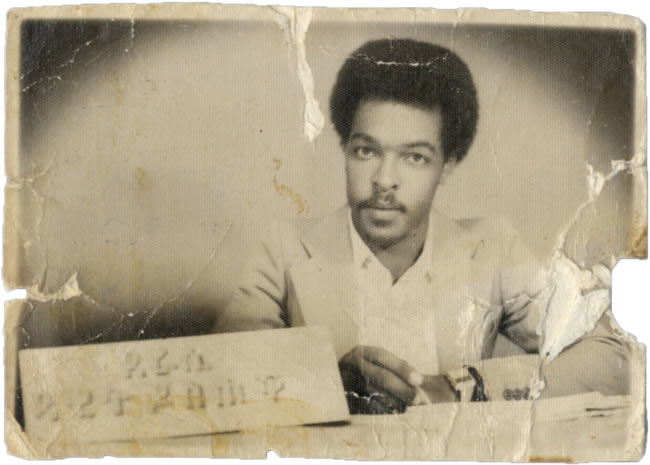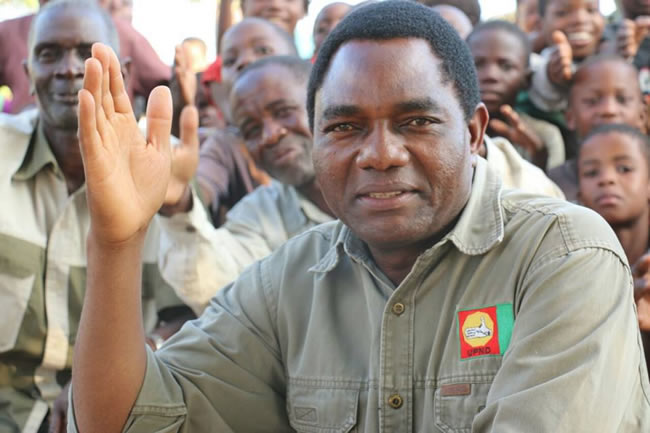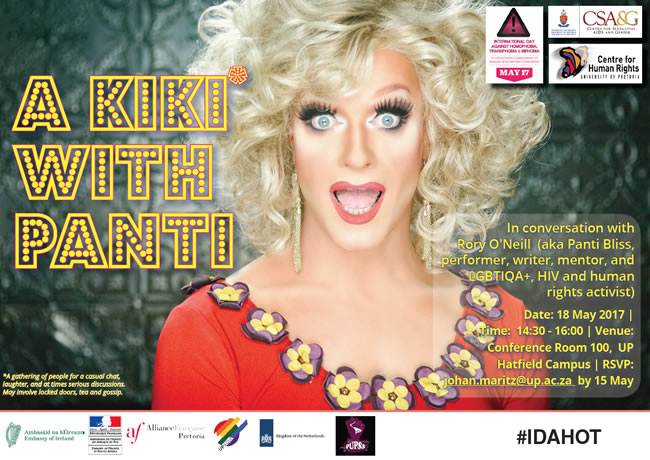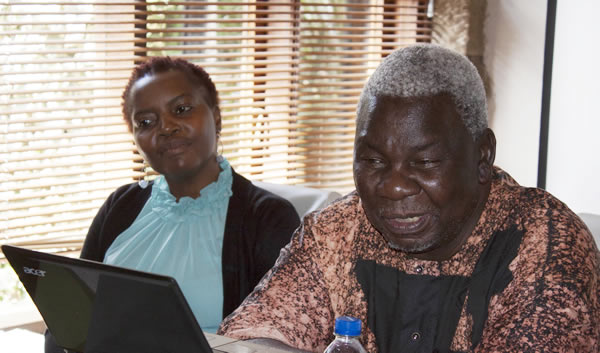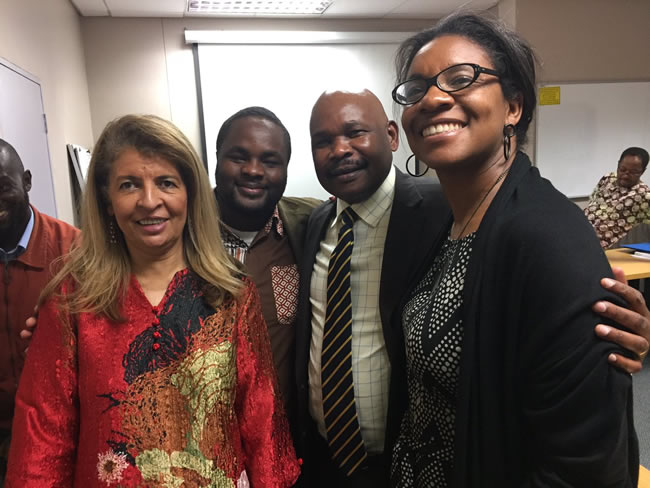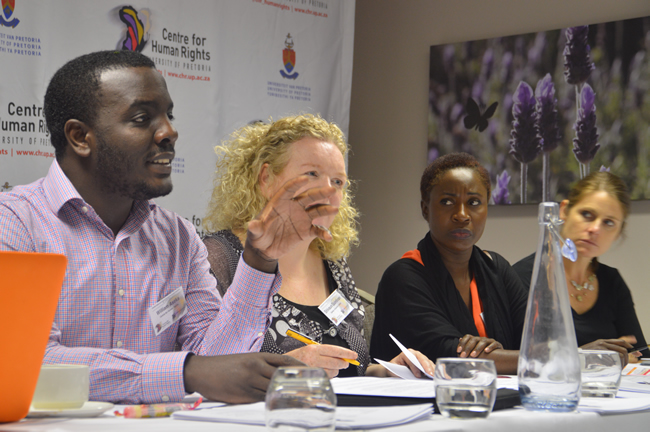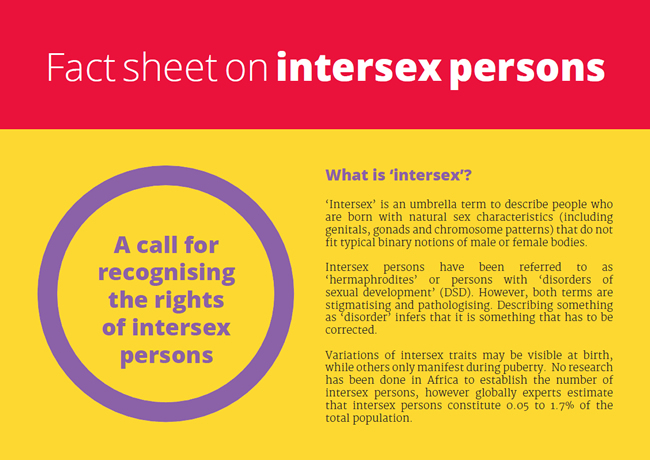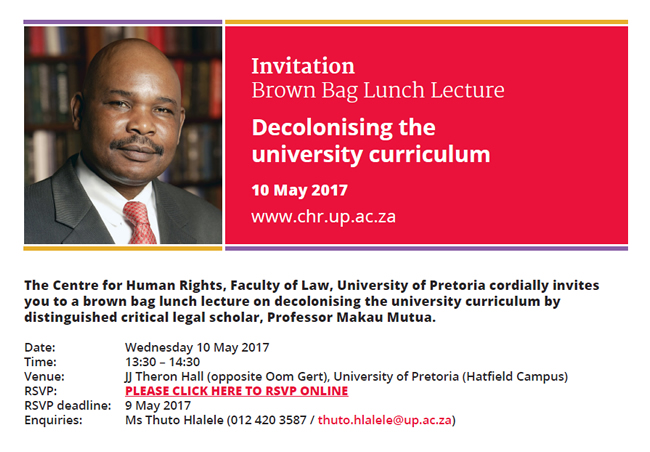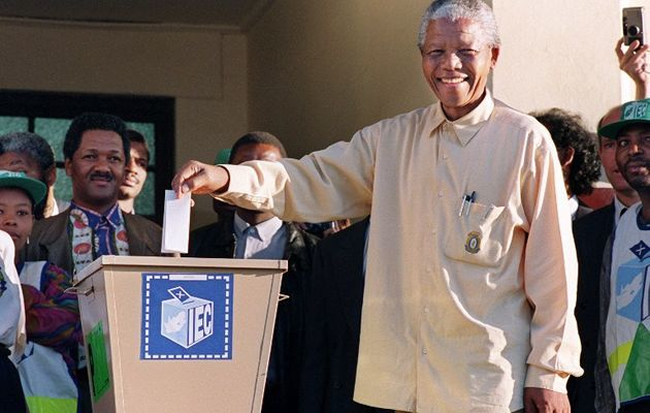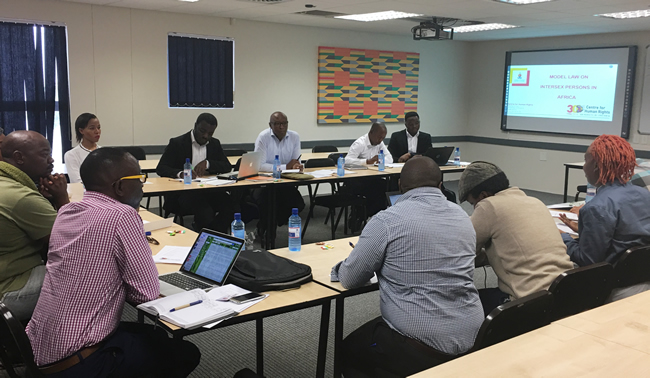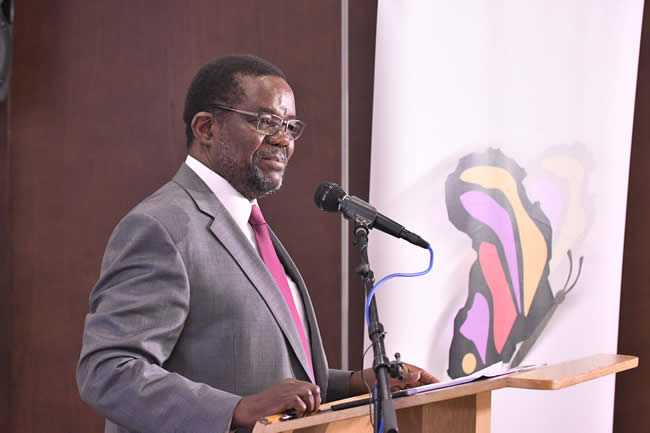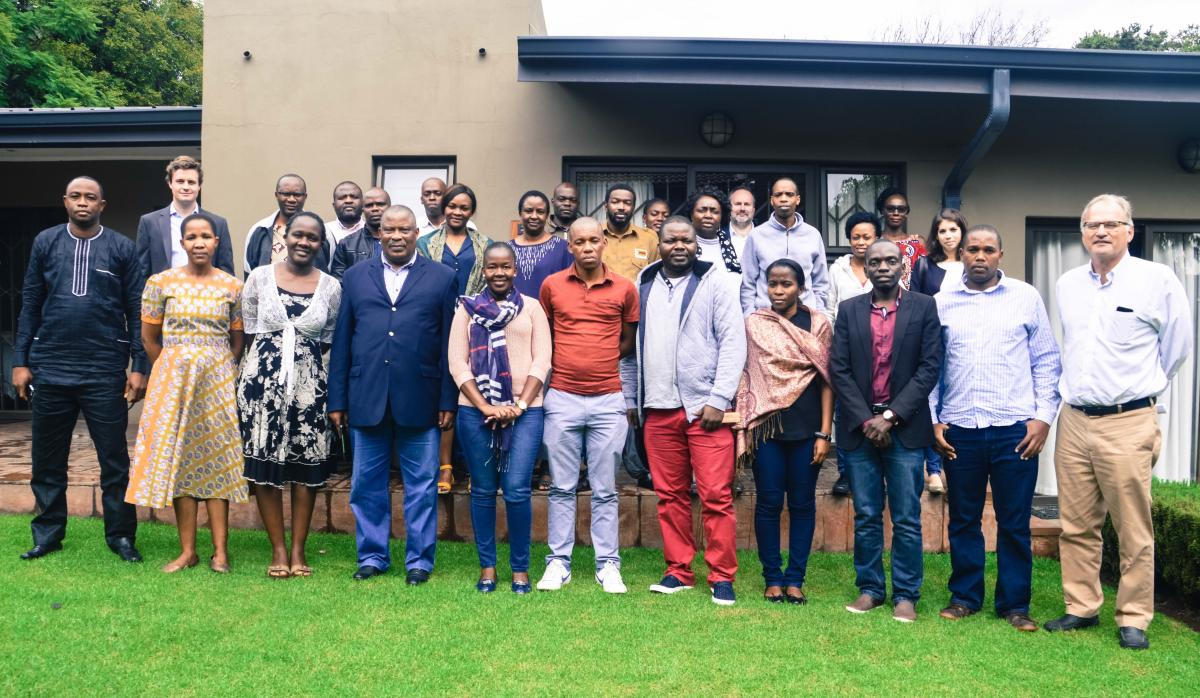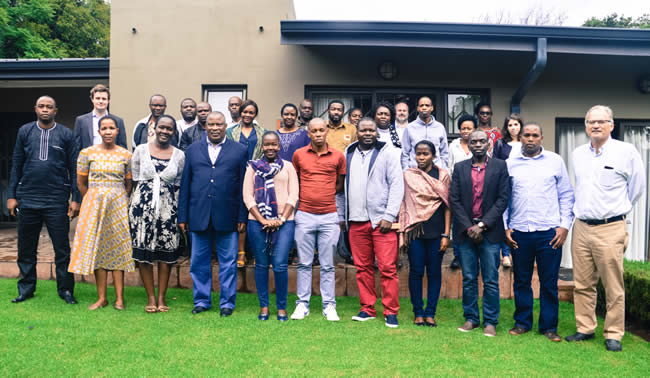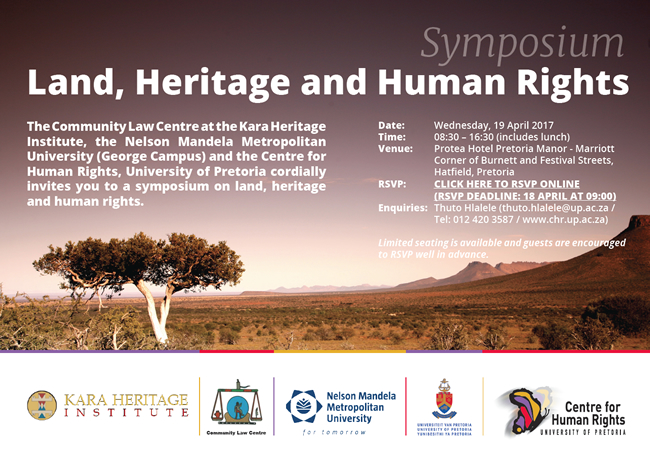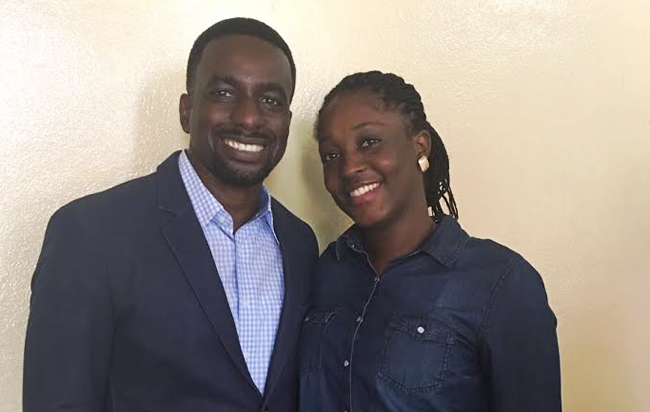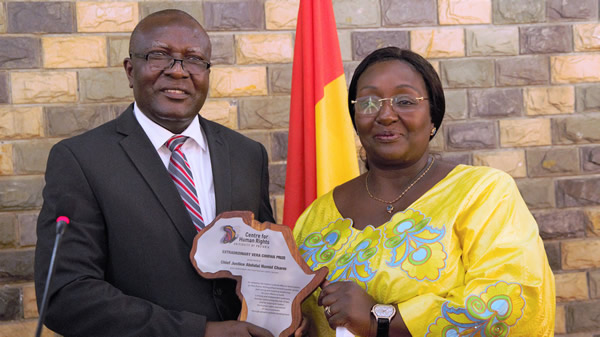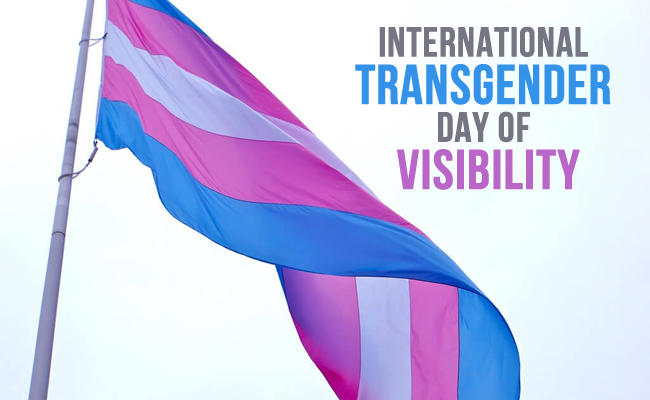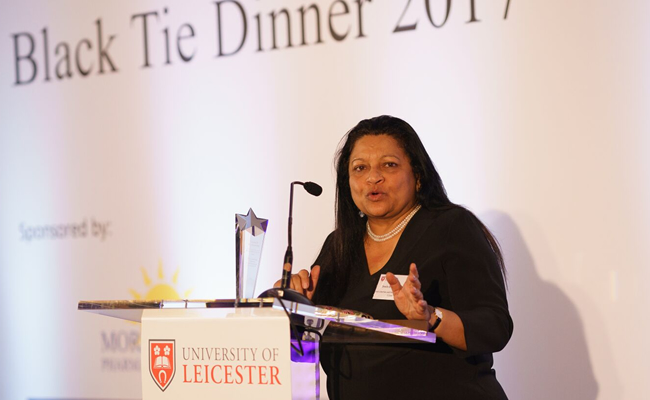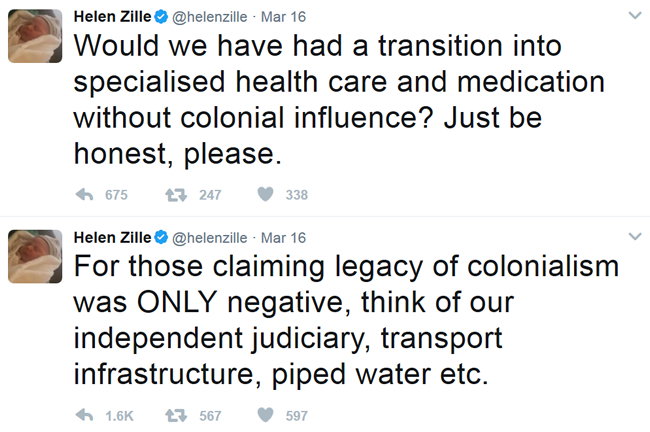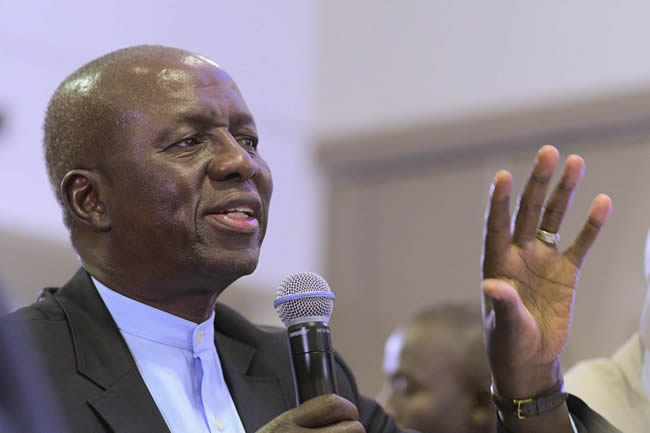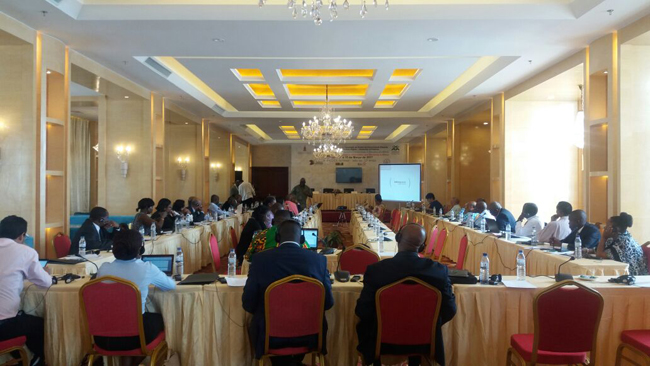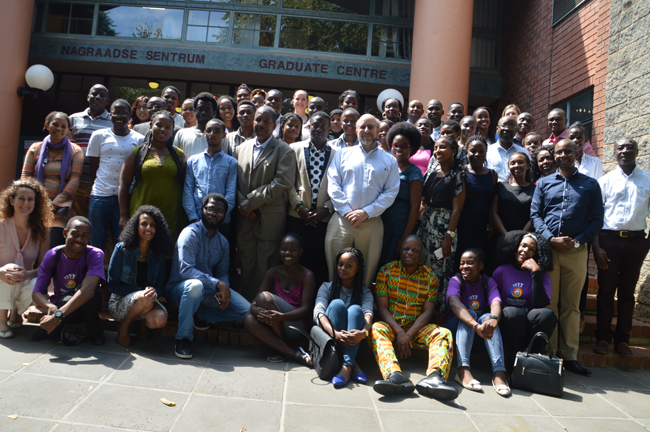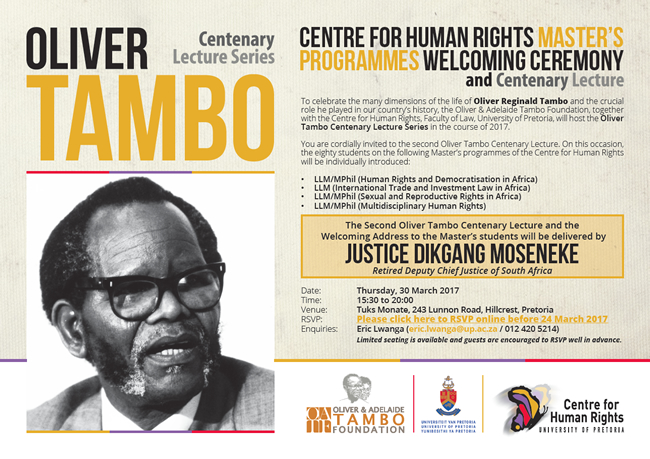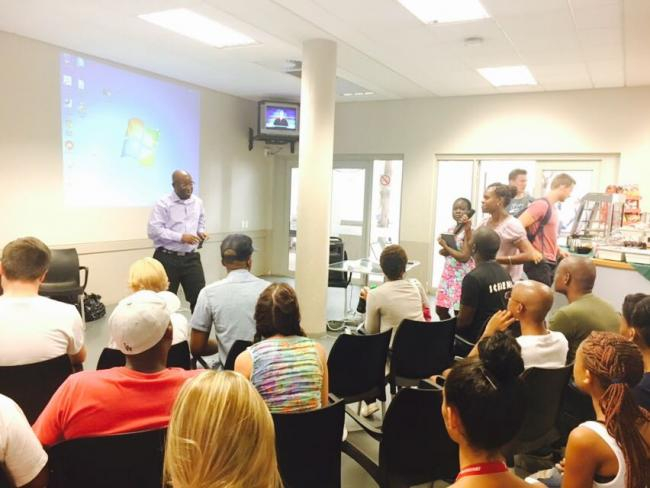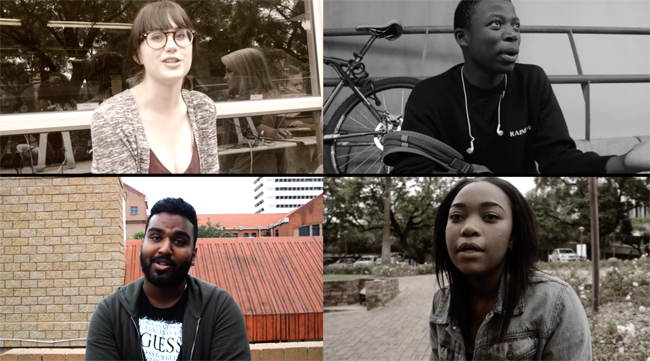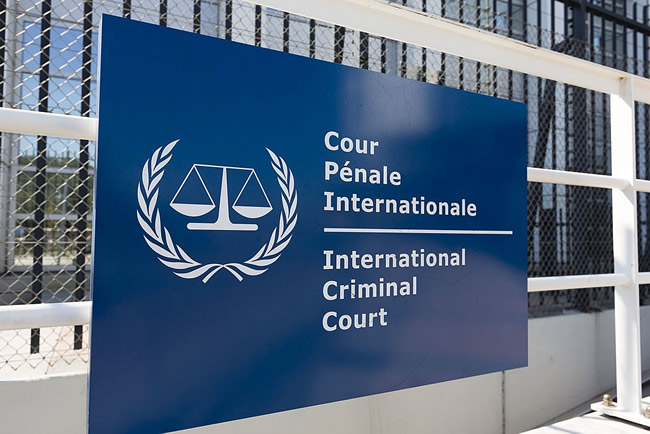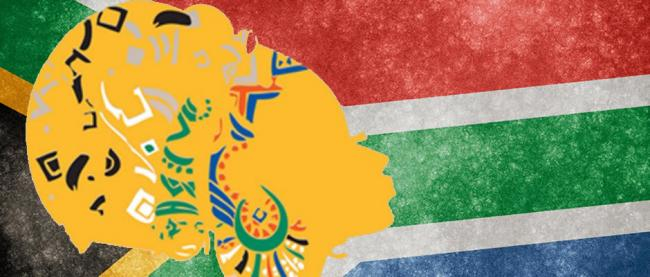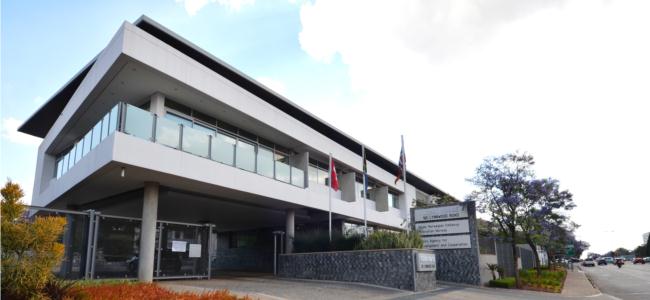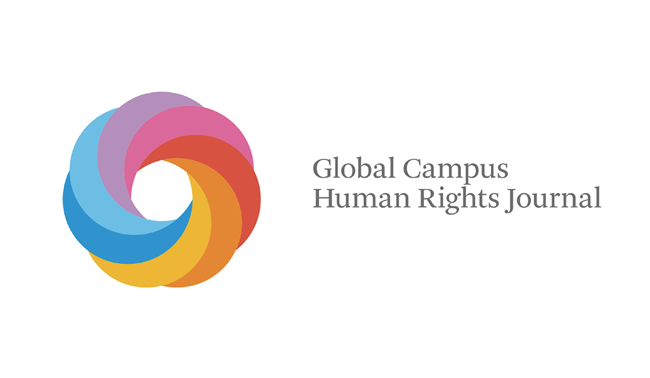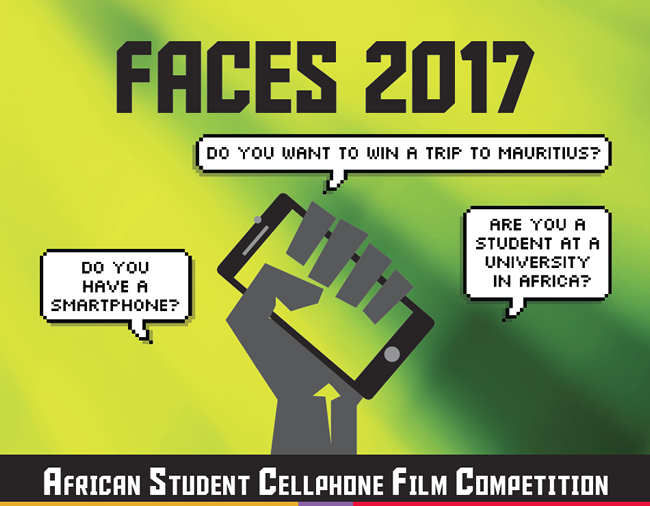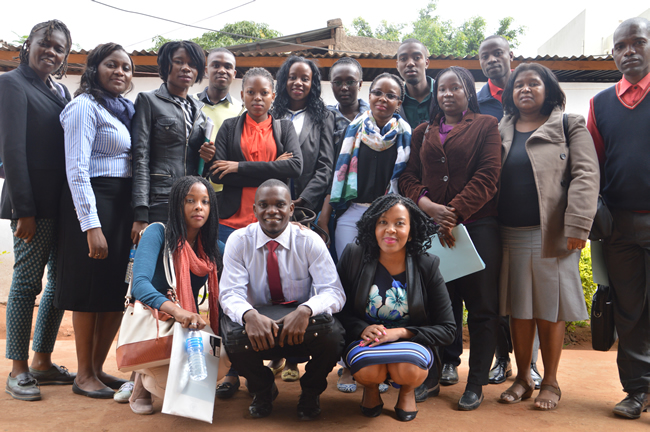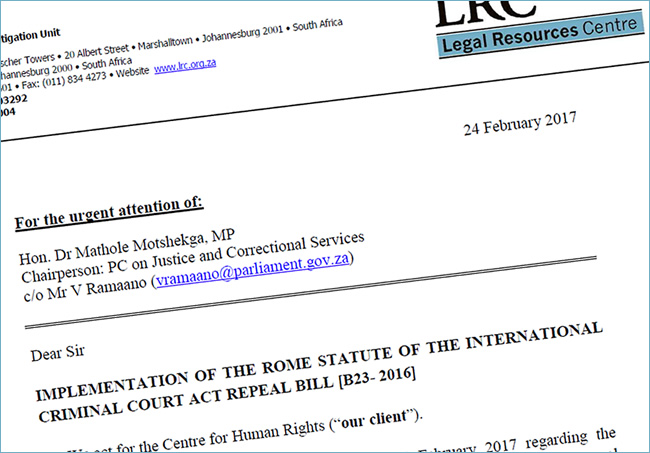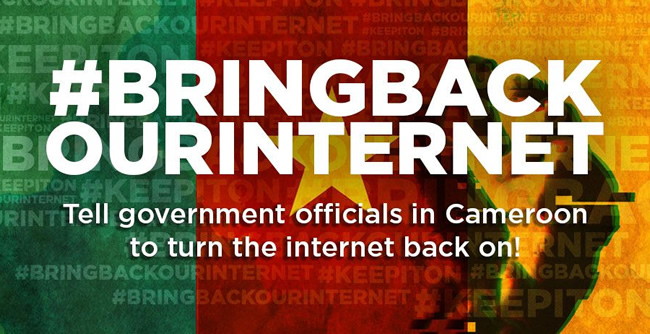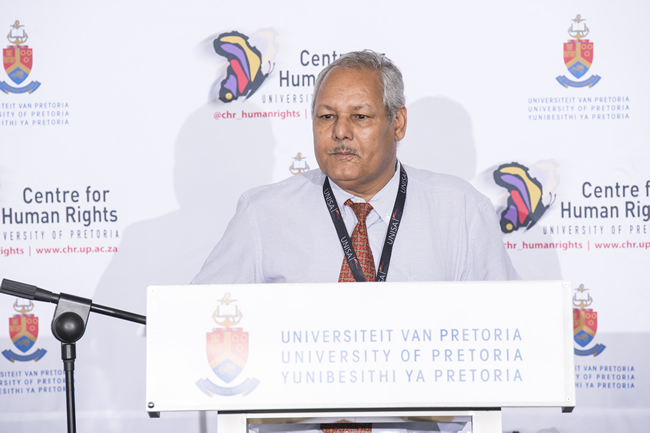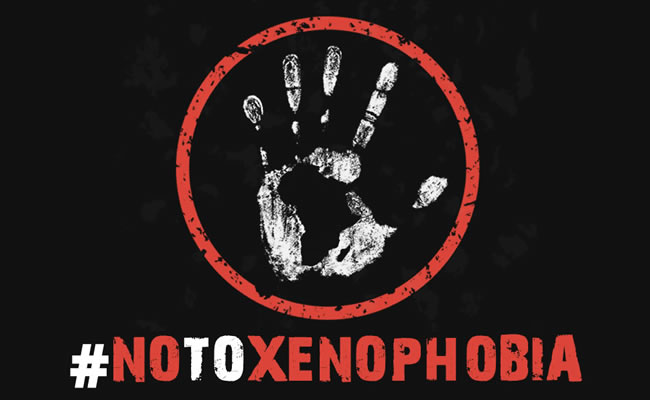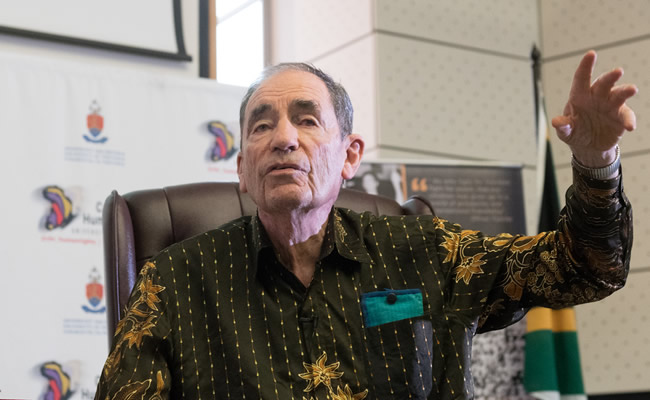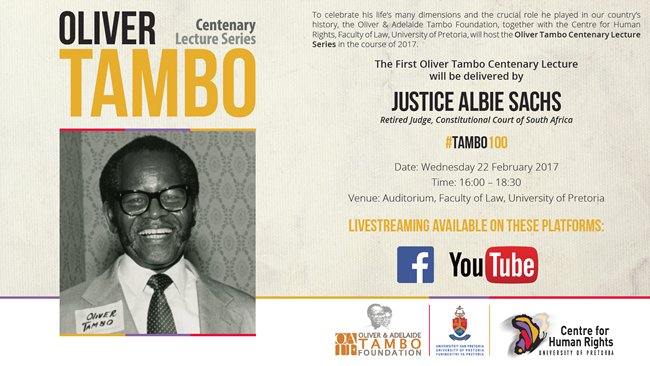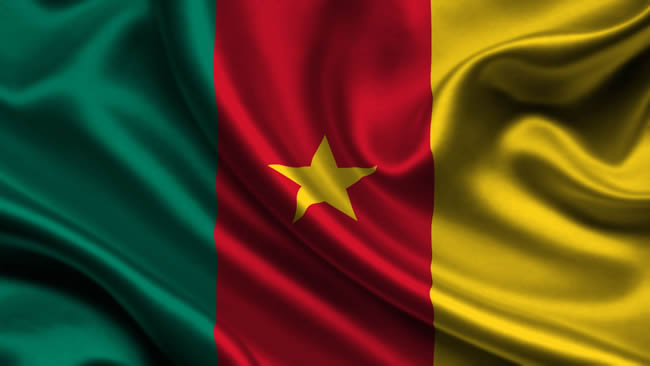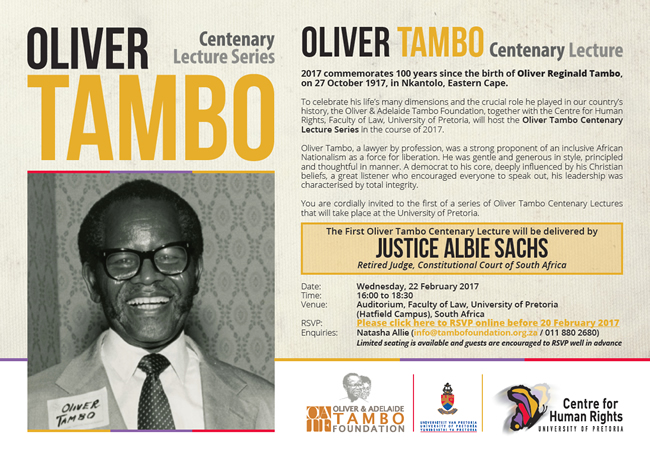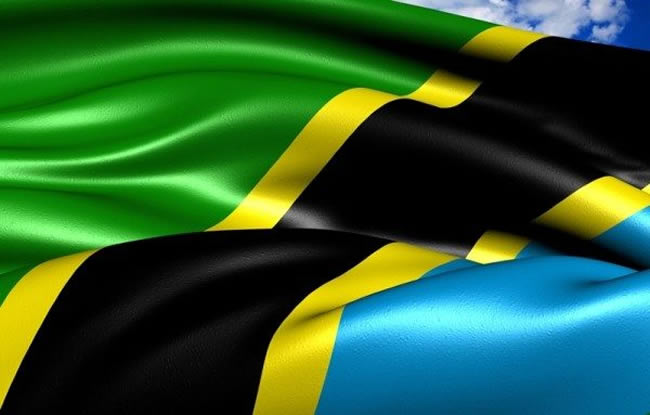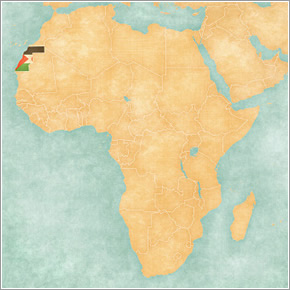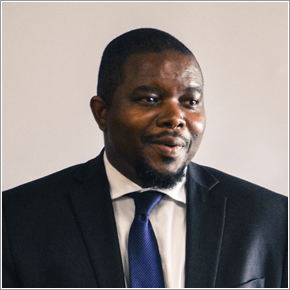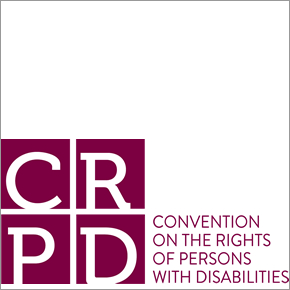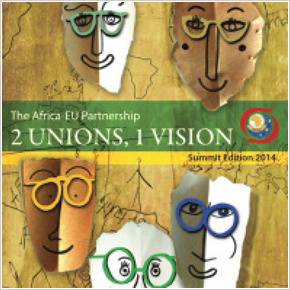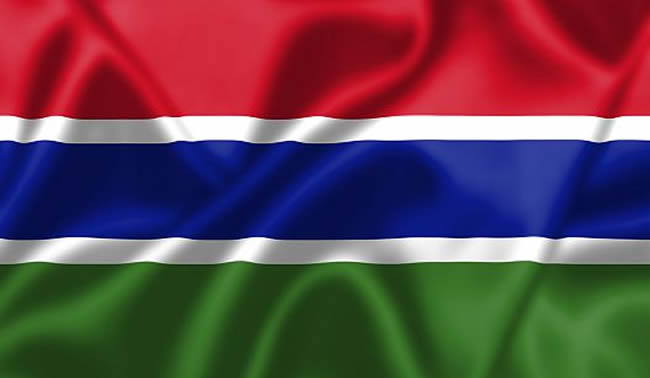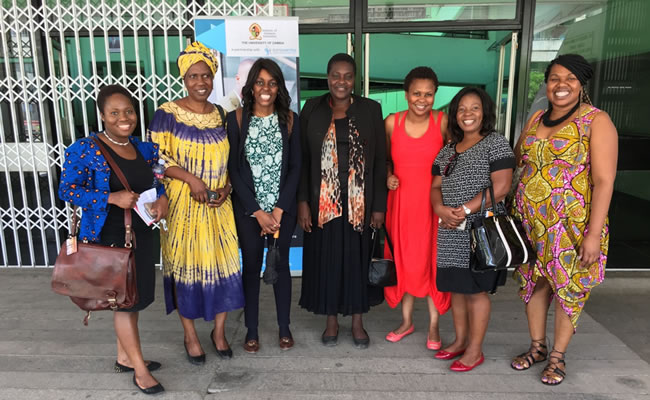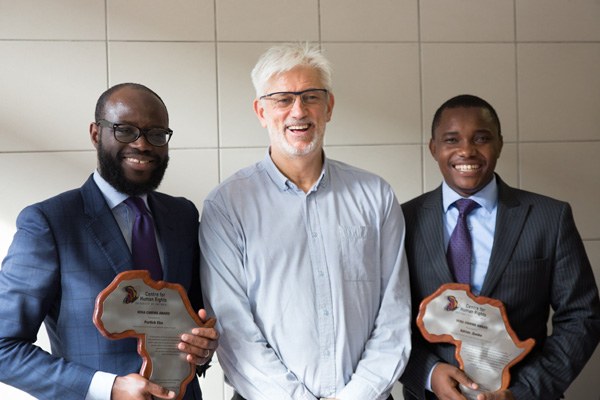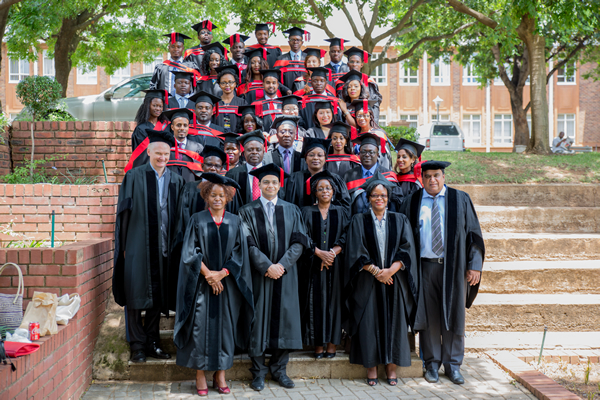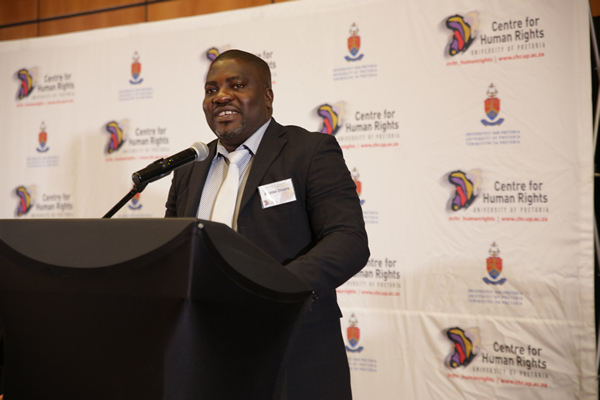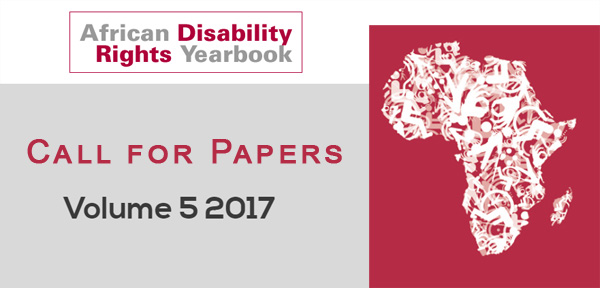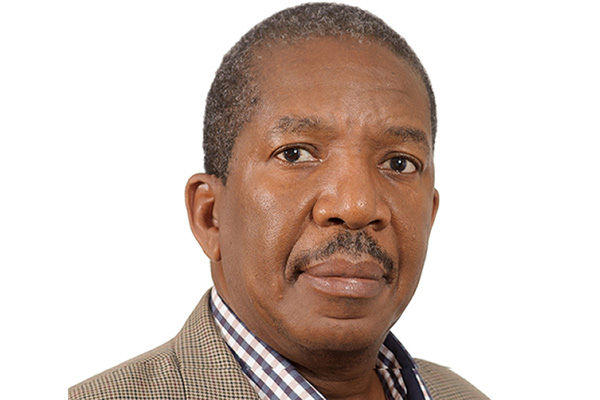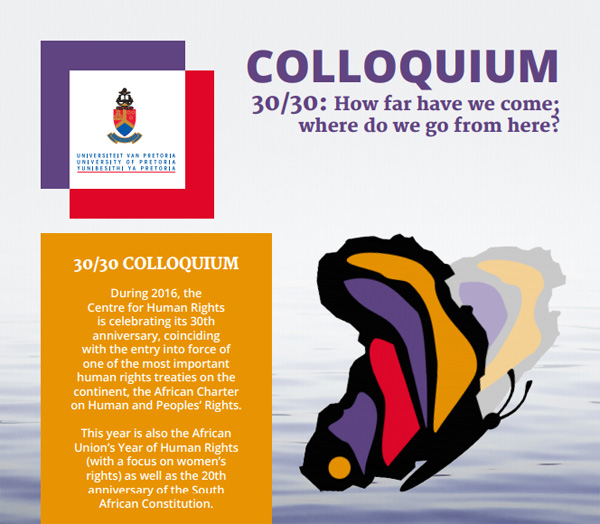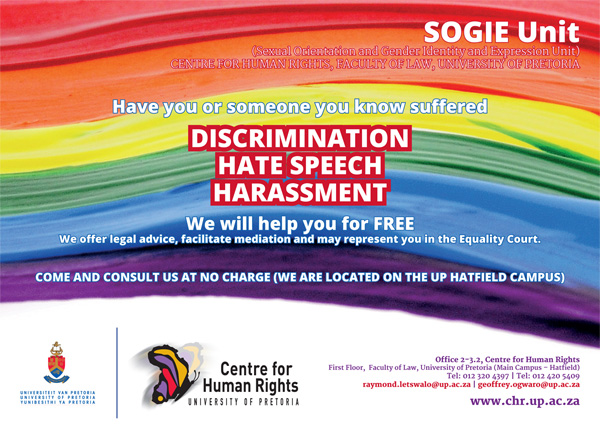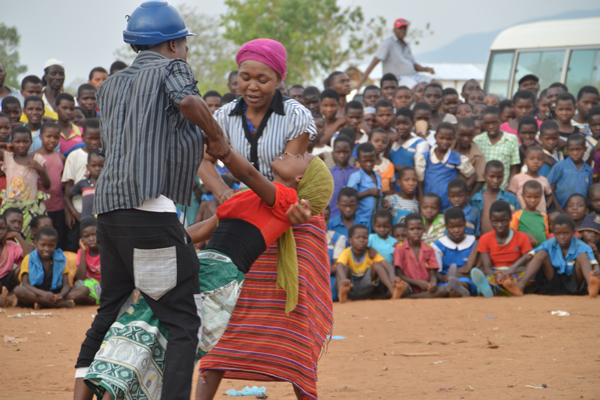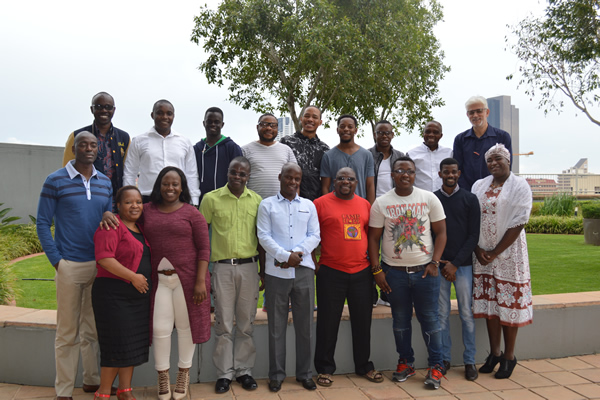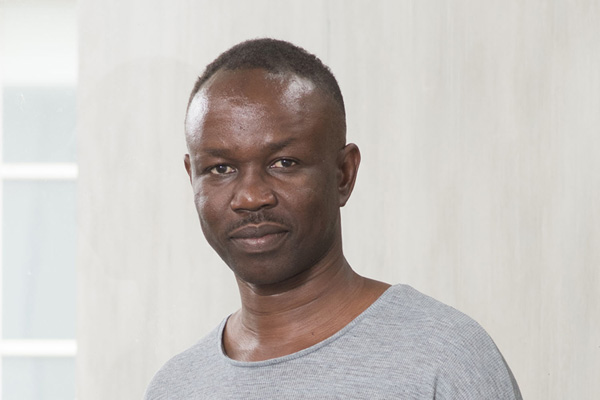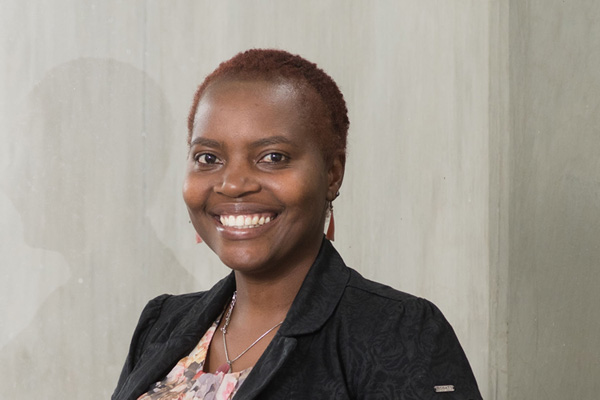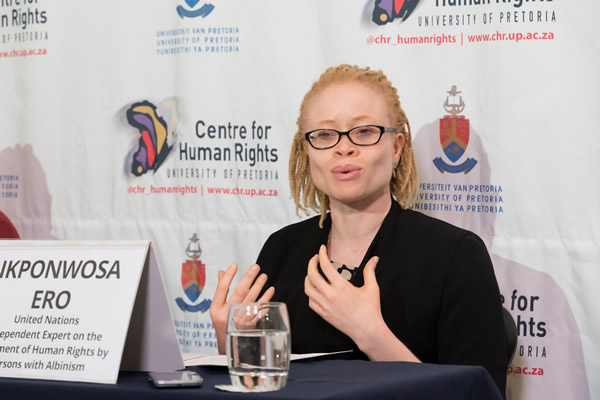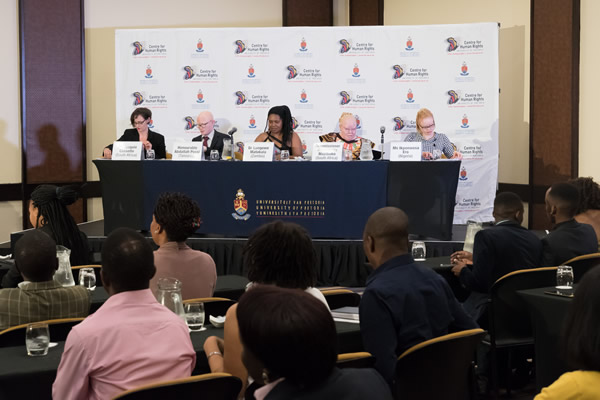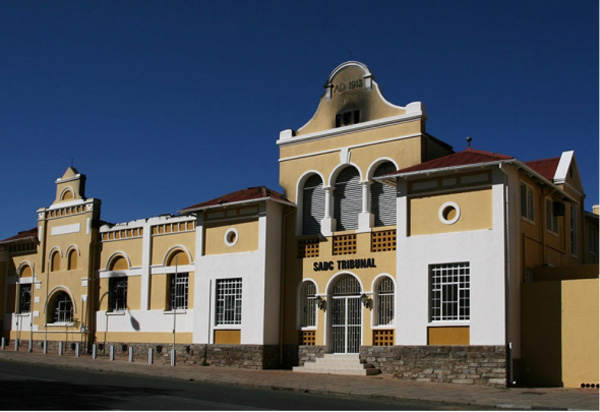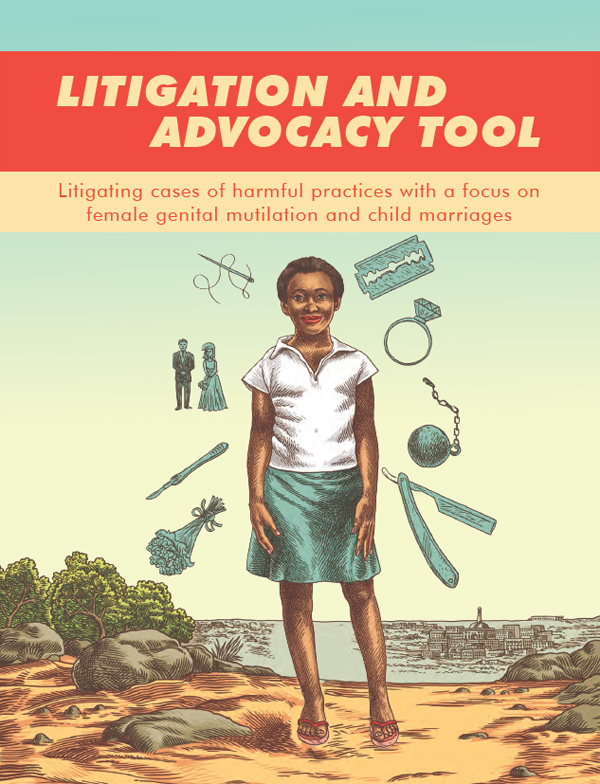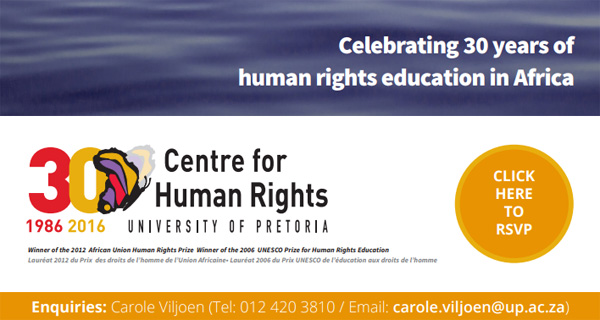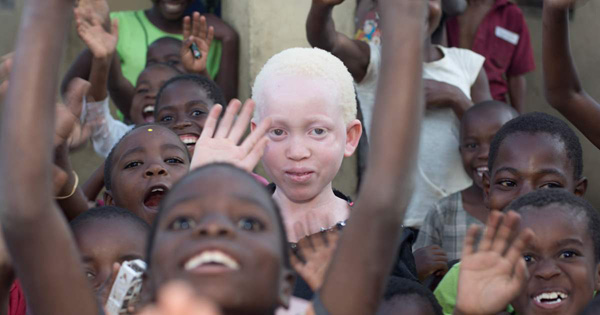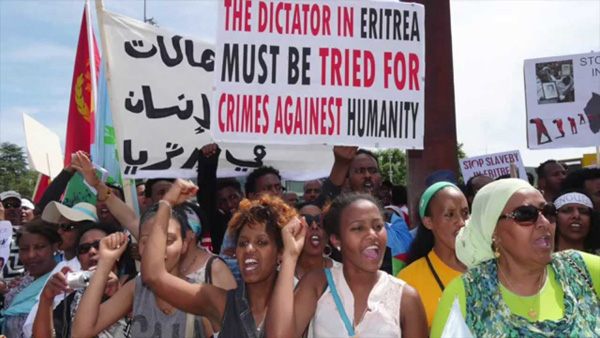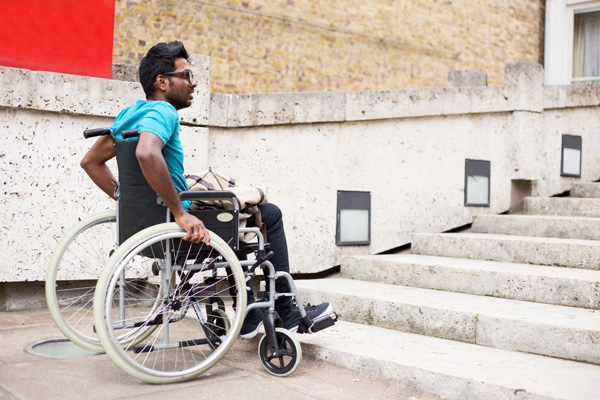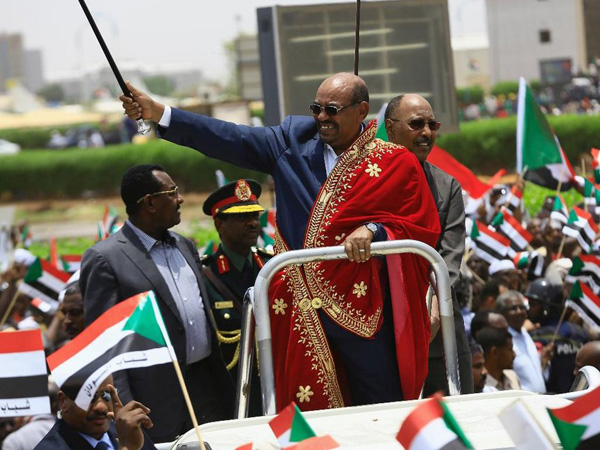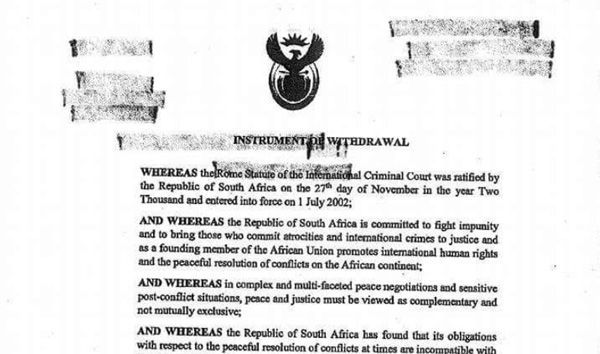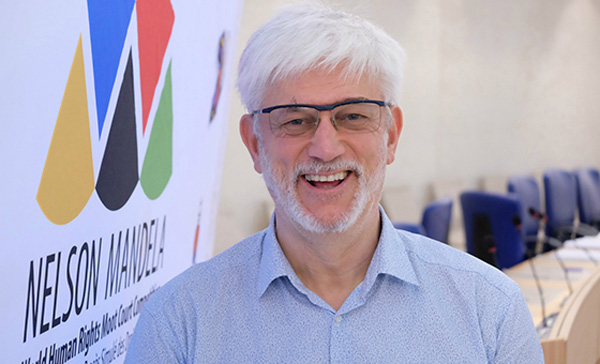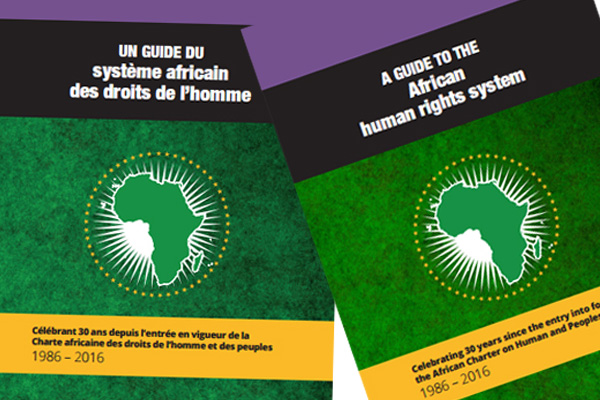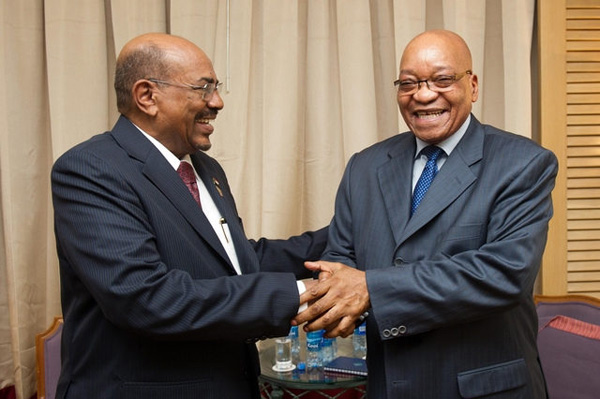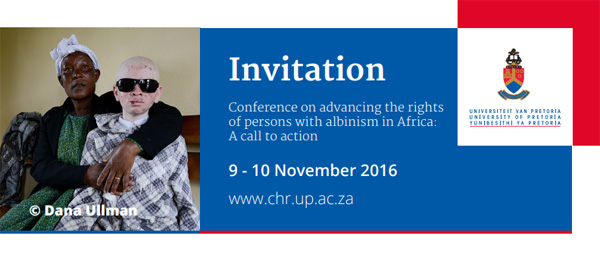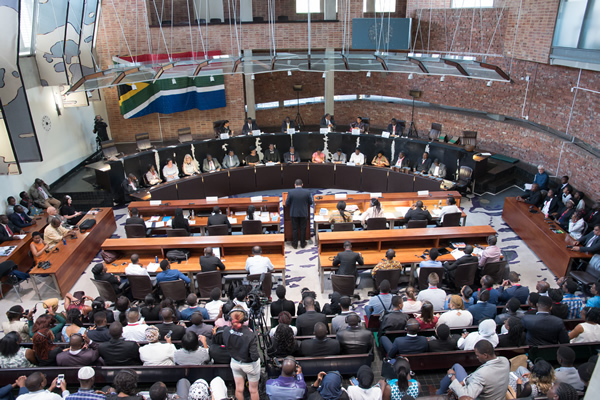- Details
The International Development Law Unit at the Centre for Human Rights, Faculty of Law, University of Pretoria cordially invites you to a seminar series titled “Trade & Investment Law Seminar Series (TILSS)”
- Details
We invite activists from the Global South to debate the challenges that the current context poses to human rights across the world.
Activists and defenders from the Global South can submit their applications to attend the 15th International Human Rights Colloquium, wich will be held from October 1 to 6, in Sao Paulo, Brazil.
- Details
The Centre for Human Rights, Faculty of Law, University of Pretoria and the Universidade Eduardo Mondlane – Faculty of Law, cordially invites you to the Annual Helen Kanzira Memorial Lecture.
The Keynote Address will be presented by: Her Excellency dr Isaura Nyusi, First Lady of Mozambique on ‘Sexual and Reproductive Rights of Women and Girls: Challenges on Maternal Health Rights’
- Details
The 5th Annual African Disability Rights Conference will be held from the 7th to the 8th of November 2017 at the Centre for Human Rights, University of Pretoria in South Africa. This year’s conference will focus on the following themes:
- a) the implications of the Convention on the Rights of Persons with Disabilities (CRPD) for the African region with particular reference to article 13, the right to access to justice and article 12, the right to equal recognition before the law;
- b) the development of mechanisms/strategies for the effective domestication and implementation of articles 12 and 13 of the CRPD and
- c) the interplay between article 13 and article 12 of the CRPD.
It is anticipated that papers presented at this conference will be reworked by authors and submitted for consideration for publication in the 2018 volume of the African Disability Rights Yearbook.
- Details
Madame Chair, Honourable Commissioners, the Centre for Human Rights welcomes the ongoing work of the Working Group on the Death Penalty and Extrajudicial, Summary or Arbitrary Killings in Africa to continue placing questions concerning the right to life, the supreme human right, high on the agenda of the African Commission.
- Details
The Centre for Human Rights earlier this year went though the process of recruiting a new Director, after the current Director's second term in that position had come to an end. However, the University’s selection committee did not shortlist any of the applicants.
The University Management subsequently decided that the University would fund a permanent position in the Centre of an Assistant Director, if the incumbent Director agrees to serve for another term. The Director (Frans Viljoen) happily agreed, and is looking forward to contribute further to advance the Centre’s vision.
We are now embarking on a process of recruiting a suitable person for the permanent full-time position of Assistant Director in the Centre.
This new position will be in addition to that of the current position of Assistant Director, which is funded by the Centre from external funds (held by Norman Taku). These developments reflect the Centre's thematic and institutional growth over thirty years.
- Details
Part of the work we do at the Gender Unit, Centre for Human Rights, University of Pretoria is to support the mandate of the Special Rapporteur on the Rights of Women in Africa especially with respect to the popularization as well as the implementation of the Maputo Protocol across Africa
One area of such support is specifically, with regards to state reporting as well as popularising the 2009 reporting guidelines on the Maputo Protocol.
- Details
On Tuesday the 9th of May 2017 Students for Law and Social Justice (SLSJ) - a student based civil society organization, worked with the Sexual Orientation, Gender Identity and Expression (SOGIE) Unit of the Centre for Human Rights at the University of Pretoria to produce an evening of engagement, conversation and debate centered around developments in the LGBTQIA+ sphere in Africa and the severe situation of violence, discrimination and oppression facing the LGBTQIA+ community in South Africa.
- Details
The Pretoria University Law Press (PULP), established in 2005 and located in the Centre for Human Rights, Faculty of Law, University of Pretoria, celebrated a landmark this week, as it launched its 175th publication. On 15 May 2017, PULP hosted Doctor Malcolm Langford, who co-edited the landmark The Optional Protocol to the International Covenant on Economic, Social and Cultural Rights: A Commentary (OP-ICESCR Commentary), recently published by PULP. Dr Langford is a renowned socio-economic rights scholar based at the Norwegian Centre for Human Rights.
The OP-ICESCR Commentary breaks new ground. It is the first and most comprehensive book of its kind. It offers rigorous scholarly commentary on the provisions of the OP-ICESCR, aimed at informing and encouraging research, reasoned argument, consistent interpretation and effective advocacy, adjudication and remedies under the Protocol. It also provides a critical resource for users of the Optional Protocol (applicants, lawyers, governments, the Committee) and a broader audience of scholars, students, national judiciaries and policy makers.
- Details
An “icon” is a word that should never be thrown around lightly. An icon is defined as a person or thing regarded as a representative or symbol of something, or someone is very successful or admired. For example, Lionel Messi could be considered an “icon” of football, Michael Jordan for basketball, Muhammed Ali for boxing. These people are the first things that come to mind when one thinks of the particular sport they are involved in. They are icons. Icons are around to inspire.
- Details
17 May is the International Day against Homophobia, Transphobia and Biphobia (IDAHOT), celebrated in more than 130 countries around the world.
The International IDAHOT Committee, founded in 2005 as an independent initiative, aimed at fighting against discriminations and injustices on the grounds of sexual orientation and/or gender identity or expression. This year, there is a special focus on families, including the role of families in the well-being of their LGBTIQ (Lesbian, Gay, Bisexual, Transgender, Intersex or Queer) members as well as respect for the rights of diverse LGBTIQ families.
- Details
At the recently concluded 29th Session of the African Committee of Experts on the Rights and Welfare of the Child (African Children’s Rights Committee) held in Lesotho, the Centre for Human Rights and RADDHO, an NGO based in Senegal, participated and presented a joint submission on the implementation of Committee’s decision in the decisions Centre for Human Rights and la Rencontre Africaine pour la Defense des Droits de l’Homme (on behalf of Senegales Talibés) v Senegal (Talibe case) ACERWC, Comm/001/2012, 15 April 2014.
This case deals with the conditions of some 100,000 children (called Talibés) who, while attending Koranic schools in Senegal, are required to beg on the streets of Dakar and other urban centres, to secure their own survival. The Centre for Human Rights and RADDHO submitted the case as far back as 2012.![]() Download this Press Statement
Download this Press Statement
- Details
Roughly above a week ago, I saw the documentary film Strike a pose. It investigates the lives and personal journeys of the seven male dancers that rocked the stage with Madonna on her Blonde Ambition World Tour in 1990, 25 years after the tour. The film is as old as 2016. But I doubt that this is piece will ever stop being relevant to the queer and HIV discourse. Perhaps there is a parallel. Perhaps there is not. But I see that gay men still need a safe space to flourish. I still see that gay men need each other- sometimes even more than we care to admit.
- Details
STATEMENT BY NGO WITH OBSERVER STATUS: CENTRE FOR HUMAN RIGHTS, FACULTY OF LAW, UNIVERSITY OF PRETORIA
60th session of the African Commission on Human and Peoples’ Rights 11 May 2017, Niamey, Nigee![]() Download this Press Statement
Download this Press Statement
- Details
In 2015, a call reverberated through South African universities. It started at Wits, moved to UCT and then to most campuses in the country. Thousands of students, at nearly every institution of higher education, demanded the decolonisation of university curricula and the radical transformation of academic spaces. This resulted in a movement towards the rejection of Eurocentric systems of knowledge and the advancement of African approaches and philosophies.
To engage further on the issue of a decolonised education model, the Centre for Human Rights, Faculty of Law, University of Pretoria, hosted a lunch lecture by renowned critical legal scholar Professor Makau Mutua. Prof Mutua teaches law at the SUNY Buffalo Law School, State University of New York, in the United States of America (USA). The lecture on 'Decolonising the university curriculum' provided an opportunity for critical reflection on South Africa’s racial and political past, its impact on tertiary education and the way forward.
- Details
Over the past six months, the English-speaking part of Cameroon has experienced serious repression and continuous human rights violations. The crisis erupted in October 2016, following a series of sit-in strikes and non-violent actions initiated by common law lawyers and teachers’ trade unions in protest against the government’s policy of assimilation through the imposition of the civil law judges to preside over cases in common law courts and French-speaking teachers to teach in English schools. This policy seems designed to systematically wipe out the legal and education systems of the peoples of Southern Cameroons.
The government’s lethal response to the strikes and protest actions led to the death of at least 8 protesters on 8 December 2016, and subsequent extra-judicial killings, disappearances, rape, maiming, torture and other forms of degrading and inhumane treatment. Civil society organisations coordinating the strikes and protest actions were banned on 17 January 2017. Leaders, including Justice Ayah Paul Abine (Supreme Court Judge), Dr Felix Agbor Balla (prominent international human rights lawyer), Dr Neba Fontem (a university lecturer), Mr Mancho Bibixy (a civil rights activists), and hundreds of other activists and protesters were arrested and transferred to the nation’s capital, Yaoundé (a civil law jurisdiction). They are currently being tried in a military court on charges of terrorism, which carries a death penalty if found guilty. These actions violate the right to fair trial. This is happening in spite of the African Commissions’ ruling in the Kelvin Gunme v Cameroon (para 215(1)(ii)) forbidding the transfer of accused persons from the English-speaking part to be tried in the French-speaking part of the country.
- Details
GENEVA (3 May 2017) – The Government of Eritrea must free journalist Dawit Isaak who has been awarded a prestigious press freedom prize some 15 years after he was detained, a United Nations human rights expert says.
The Special Rapporteur on the situation of human rights in Eritrea, Sheila B. Keetharuth, is also calling on the authorities in Asmara to release unconditionally all others detained unlawfully.
“The Eritrean authorities should stop the practice of arrests and detention carried out without legal basis instantly,” said Ms. Keetharuth, welcoming the award of the UNESCO/Guillermo Cano World Press Freedom Prize 2017 to Mr. Isaak.
- Details
The Centre for Human Rights, Faculty of Law, University of Pretoria, expresses deep concern about the treason charge Zambia’s opposition party leader Hakainde Hichilema is facing.
The Centre is deeply concerned about the serious recent ethnic tensions in Zambia, which appear to be politically motivated and to be part of an orchestrated campaign by sections of senior level politicians seeking to earn political dividends at the expense of peace in the country.
Hichilema faces two charges, one for obstructing President Edgar Lungu’s motorcade, and another for treason, which is a non-bailable offence. Treason is an extremely serious offence, for which the maximum penalty is the death penalty.
- Details
kiki* with Panti (*A gathering of people for a casual chat, laughter, and at times serious discussions. May involve locked doors, tea and gossip.) In conversation with Rory O'Neill (aka Panti Bliss, performer, writer, mentor, and LGBTIQA+, HIV and human rights activist)
Event Details
Date: Thursday 18 May 2017
Time: 14:30 - 16:00
Venue: Conference Room 100, UP (Hatfield Campus)
RSVP: johan.maritz@up.ac.za by 15 May 2017
GENEVA (3 May 2017) – The Government of Eritrea must free journalist Dawit Isaak who has been awarded a prestigious press freedom prize some 15 years after he was detained, a United Nations human rights expert says.
The Special Rapporteur on the situation of human rights in Eritrea, Sheila B. Keetharuth, is also calling on the authorities in Asmara to release unconditionally all others detained unlawfully.
“The Eritrean authorities should stop the practice of arrests and detention carried out without legal basis instantly,” said Ms. Keetharuth, welcoming the award of the UNESCO/Guillermo Cano World Press Freedom Prize 2017 to Mr. Isaak.
Dawit Isaak, who is 52 and a playwright, journalist and writer, moved to Sweden in 1987, where he later became a citizen. He returned to Eritrea only after independence in 1993 and was one of the founders and reporters of Setit, the first independent newspaper in the country.
Mr. Isaak was arrested in September 2001 during a political crackdown on the so-called G-15, a group of politicians, and journalists critical of Government policies. Some were detained and tortured, others disappeared. The last known sighting of Mr. Isaak was in 2005. His whereabouts now are unknown.
“The case of Mr. Isaak is emblematic of all those who have been subjected to enforced disappearances by the Government of Eritrea and remain unaccounted for,” said Ms. Keetharuth.
The Special Rapporteur recalled the findings of the UN Commission of Inquiry on Human Rights in Eritrea, which concluded that there were reasonable grounds to believe that Eritrean officials had committed crimes against humanity, including the crime of enforced disappearance, in a persistent, widespread and systematic manner since 1991.
“The Government of Eritrea has an obligation to urgently provide information on the fate and whereabouts of all those deprived of physical liberty. This would be a first and long-overdue indication that the Government is committed to rebuilding trust with the Eritrean people,” Ms. Keetharuth said.
“By allowing independent monitors immediate and unhindered access to all places of detention, official and unofficial, the Government would send a strong signal that it acknowledges human rights violations of the past, while taking steps to improve the situation on the ground now.
“The arrests of Dawit Isaak and his fellow journalists remain the most visible sign of repression of freedom of expression. The Eritrean authorities continue to stifle all forms of expression that could be perceived as critical of the Government and its policies,” she said.
Ms. Keetharuth reaffirmed that freedom of expression was a basic human right, and a free press one of the tenets of a democratic society, providing a valuable check on potential excesses by government.
Ms. Sheila B. Keetharuth (Mauritius) was appointed as the first Special Rapporteur on the situation of human rights in Eritrea in October 2012. From 2014 to 2016, she also served as a member of the Commission of Inquiry on Human Rights in Eritrea. Since May 2014, Ms. Keetharuth is an expert member of the Working Group on Extractive Industries, Environment and Human Rights Violations of the African Commission on Human and Peoples’ Rights. Until 2012, Ms. Keetharuth was the Executive Director of the Institute for Human Rights and Development in Africa in Banjul, The Gambia. She also worked with Amnesty International in Kampala, Uganda, and as a lawyer and broadcaster in Mauritius. In 2017, Ms. Keetharuth was awarded with the Outstanding Alumni Achievement Award by the University of Leicester, in recognition of her human rights work.
Special Rapporteurs are part of what is known as the Special Procedures of the Human Rights Council. Special Procedures, the largest body of independent experts in the UN Human Rights system, is the general name of the Council’s independent fact-finding and monitoring mechanisms that address either specific country situations or thematic issues in all parts of the world. Special Procedures’ experts work on a voluntary basis; they are not UN staff and do not receive a salary for their work. They are independent from any government or organization and serve in their individual capacity.
- See more at: http://www.ohchr.org/en/NewsEvents/Pages/DisplayNews.aspx?NewsID=21571&LangID=E#sthash.rFwqqqsA.dpuf- Details
In view of strengthening the mandate of the Special Rapporteur on the Rights of Women in Africa (SRRWA), the Gender Unit of the Centre for Human Rights (CHR) organised a three-day refresher workshop on increasing states capacity for reporting under the Protocol to the African Charter on Human and Peoples’ Rights on the Rights of Women in Africa (the Maputo Protocol) in the Kingdom of Lesotho. The workshop was held in collaboration with the Ministry of Law and Constitutional Affairs.
- Details
What is unique about Africa’s approach to international law? What would be the features of such an approach? This is some of the questions a group of forty international law scholars from across Africa and the diaspora asked themselves at a Round Table hosted by the Centre for Human Rights, Faculty of Law, University of Pretoria, on 3 and 4 May 2017.
The Round Table was convened under the theme ‘African approaches to international law’. During the Round Table the concept of an “African approach” was problematized, with participants agreeing that this notion should not be racially or culturally based, but spatially, or in terms of one’s methodological ‘orientation’.
One of the participants was Professor Makau wa Mutua, who is well known for his critical scholarship, and for having been instrumental in launching a school of anti-hegemonic thinking on international law, Third World Approaches to International Law (TWAIL). He emphasized the ‘African’ origins of TWAIL and contended that it has much to offer to African scholars critically engaged with international law.
- Details
The Open Society Foundations (OSF) in collaboration with the Centre for Human Rights (CHR) launched the Disability Rights Scholarship Programme (DRSP) in 2011. The CHR through the Disability Rights Unit has played a significant role of coordinating the DRSP which has included: marketing the programme, receiving applications, shortlisting semi-finalists and hosting the interviews of the shortlisted semi-finalists.
In 2016 the Open Society Foundation as the funder of the DRSP extended its funding and introduced for the first time an Inclusive Education Scholarship Programme (IESP), also in collaboration with the CHR.
DRSP and IESP are open to disability rights advocates, lawyers, and educators who are interested in the development of new legislation, jurisprudence, policy and research that will harness the innovations and opportunities offered by the domestication of the United Nations Convention on the Rights of Persons with Disabilities (CRPD). For the 2017 programme those applying for the programmes had to be citizens of Mozambique, Kenya, Malawi, Sudan, South Sudan, Tanzania, Tunisia, or Uganda at the time of application.
- Details
The Centre for Human Rights cordially invites all interested stakeholders attending the NGO Forum preceding the 60th Ordinary Session of the African Commission on Human and Peoples’ Rights in Niamey, Niger, to its presentation of a proposed Draft Model Law on Intersex Persons Rights in Africa. The objective of the meeting is to share the idea of the Model Law, get your views and devise a possible strategy of getting the Model Law adopted and implemented.
Intersex persons continue to face unfair discrimination based on their natural biological sex characteristics. With the exception of a few African countries there is no law that mentions or protects the rights of intersex persons. The Centre for Human Rights anticipates that this Model Law will address the gap in national legislation and assist African States in developing national laws, policies and institutions to protect the rights of all intersex persons. The Model Law will also act as a tool for advocating for law reform and stronger legal recognition and protection of fundamental rights and freedoms of intersex persons in Africa.
- Details
The Centre for Human Rights, Faculty of Law, University of Pretoria cordially invites you to a brown bag lunch lecture on decolonising the university curriculum by distinguished critical legal scholar, Professor Makau Mutua.
- Details
It is not often that I identify with the race struggle. One does not become genuinely emotionally aware of it by reading Nelson Mandela’s Long Walk to Freedom, seeing Idris Elba’s rendition of the Madiba or the Sophia town play- although I believe, I came very close. ‘Race’ has not always my reality. I live here in South Africa but I do not pretend to understand it fully, yet. What I do share with this reality is the consciousness of a tedious journey of struggling towards acceptance. If this is anything to go by, the parallel realities of the several immutable features that attract pain and exclusion share the same ‘darkness’. These features, race inclusive, are gender and gender expression, sex and sexuality, disability at several levels, ethnicity and ancestry, social and political class, religious affiliations or the lack of it. There will really be no end to this list. But Freedom Day every year as the celebration of the first time that exclusion was formally stopped as regards the peoples’ right to vote is not only a symbol of so much but a parallel victory for every reality that smacks of discrimination and exclusion.
- Details
The Centre for Human Rights joins the rest of South Africa to celebrate Freedom Day 2017. On 27 April 1994, there was a major shift in South Africa’s trajectory with the first non-racial post-apartheid election being held in the country. Twenty three years ago, by this symbolic exercise, apartheid and oppression were formally rejected and South Africa resolved to ensure democracy and equality. This Freedom Day milestone was preceded by the struggle, bloodshed, purposefulness, hard work and the resilience of the people of South Africa. However, it is pertinent to note that the celebration of Freedom Day is South Africa’s victory just as much as it is the victory of Africa and the world. In Nelson Mandela’s speech at the 1995 Freedom Day celebration, he stated that Freedom Day marks a ‘transition from a history of oppression to a future of freedom.’ While revelling in our glorious past on a day like today, South Africa’s present and tomorrow are equally to be reflected upon and attended to.
- Details
On 24 April 2017, the Centre for Human Rights hosted its first consultative meeting on the Model Law on the rights of intersex persons in Africa. The meeting gathered together intersex rights activists in South Africa, coming from the following organisations: Iranti, AIDS Rights Alliance of Southern Africa (ARASA), Open Society Initiative for Southern Africa (OSISA), Transgender Intersex Africa (TIA) and OUT Well-Being. Also in attendance was John Chigiti from Gender Minorities Action Trust Foundation-Kenya (GMAT), who has represented intersex persons before the Kenyan courts.
The purpose of the meeting was to validate the Draft Model Law on intersex persons, which the Centre for Human Rights is currently drafting for eventual tabling at the African Commission on Human and Peoples’ Rights. The Draft Model Law seeks to prevent unfair discrimination and to protect and promote of the rights of intersex persons in African countries.
- Details
Dear Africa,
It’s not so often that I get to run my mind’s musings by you. This was worse when you were a slim black leather volume on a green plastic table in a quiet part of Port Harcourt. Now you are the world. You are the minds of countless dreamers, lovers, activists, writers and travellers that are quizzed and dare to quiz. What is this quiz, this mystery? Not knowing, not sharing, not seeing, not hearing and as such, neither bearing nor understanding.
Often, I think, prejudice is nourished not by hate but by distance. Of course, distance permits us perspective and some objectivity. But it is often to be blamed for skewed and blurry vision. More so, it is often difficult to understand that which is not engaged with. However, we do not all have the audacity or opportunity to engage even if we wanted to.
So we set out to bring the picture closer. The mysteries of wearing queer ‘shoes’ in Africa as Africans. The taste and textures of the throbbing and pangs . Let’s talk. Let’s write. Just us. Let’s study and listen so that seeing would be much clearer. Let’s walk, engage in no particular order but let’s resolve to attend to every chapter there is before we are done. The chapters on love and living, the places, scars, secrets , strengths, failures and victories, fears, faiths and realities of our lesbian, gay, bisexual, transgender, intersex, queer, asexual and non-binary selves.
- Details
Delegates to a symposium on land, heritage and human rights gathered in Pretoria for an urgent dialogue.
They heard that a human rights approach to land redistribution, grounded in the effective implementation of Section 25 of the 1996 Constitution of South Africa, can still guarantee a life of dignity, equality and freedom for all South Africans. This was the view expressed by Prof. Bongani Majola, Chair of the South African Human Rights Commission. Prof Mathole Motshekga, Chair of the Parliamentary Portfolio Committee for Justice and Correctional Services, agreed with this sentiment, adding that Parliament has not done enough to effectively make use of the possibilities allowed for under Section 25 of the Constitution, to adopt enabling legislation.
- Details
The right to life is often described as a supreme human right, but it is clearly under pressure worldwide.The Centre for Human Rights, University of Pretoria for the first time hosted its first annual short course on the right to life from 10-13April 2017. The course brought together several participants from across Africa, mainly representing civil society, national human rights institutions, police officers, prosecutors and academia.
- Details
The right to life is often described as a supreme human right, but it is clearly under pressure worldwide.The Centre for Human Rights, University of Pretoria for the first time hosted its first annual short course on the right to life from 10-13April 2017. The course brought together several participants from across Africa, mainly representing civil society, national human rights institutions, police officers, prosecutors and academia.
Experts in the field who lectured and participated on panel discussion consisted of: Professor Christof Heyns, Director Institute for International and Comparative Law in Africa University of Pretoria and Former United Nations Special Rapporteur on extrajudicial, summary or arbitrary executions; Commissioner Solomon Dersso, African Commission on Human and Peoples’ Rights; Commissioner Med Kaggwa, Member of the African Commission on Human and Peoples’ Rights’ Working Group on the Death Penalty and Extra-Judicial, Summary or Arbitrary Killings in Africa; Dr Thomas Probert, Institute for International and Comparative Law in Africa; Stuart Maslen, Institute for International and Comparative Law in Africa; Valentina Cadelo, Geneva Academy of International Humanitarian Law and Human Rights; Dr Japhet Biegon, Amnesty International; Sarah Swart, International Committee of the Red Cross; Sylvie van Lammeren, International Committee of the Red Cross; Dr Thompson Chengeta, Institute for International and Comparative Law in Africa and Adebayo Okeowo, Centre for Human Rights. The course is the first of its kind presented by an academic institution in Africa.
- Details
The Community Law Centre at the Kara Heritage Institute, the Nelson Mandela Metropolitan University (George Campus) and the Centre for Human Rights, University of Pretoria cordially invites you to a symposium on land, heritage and human rights.
![]() Download Section 25 of the Constitution of the Republic of South Africa (Property)
Download Section 25 of the Constitution of the Republic of South Africa (Property)
- Details
Since graduating from the Centre in 1998 with his LLM degree, Mr Melron Nicol-Wilson has been an outstanding ambassador of the Centre's values of excellence and ubuntu, through his work as a human rights defender in Sierra Leone and abroad.
Melron Nicol-Wilson is an alumnus of a unique and distinguished pedigree. He joined the Centre in 1998, with academic distinctions from Fourah Bay College and the Sierra Leone Bar School where finished second in a class of 22. In the course of his LLM studies here, he demonstrated a synthesis of intellectual aptitude, the capacity for rigorous study and an indelible personal commitment to improving the lives of others with the instrument of law.
- Details
“The [Maputo] Protocol stands as a comprehensive instrument that demonstrates the good will of African States to end all forms of violence against women… Notwithstanding that, our role as women has been fraught with challenges and circumstances of vulnerability”. First Lady of Sierra Leone Her Excellency Mrs Sia Yama Koroma, rightly noted as she gave the Keynote address at a state reporting workshop that was hosted by the Gender Unit in Freetown from 22-24 March 2017. She was speaking at the opening ceremony which also saw the awarding of the first Extraordinary Vera Chirwa Award to the Chief Justice of Sierra Leone Honourable Justice Abdulai Hamid Charm, an alumnus of the Centre for Human Rights, for his contribution to human rights in Sierra Leone.![]() Download the introduction to Chief Justice Charm on receiving the first Extraordinary Vera Chirwa Award
Download the introduction to Chief Justice Charm on receiving the first Extraordinary Vera Chirwa Award
- Details
Dr Anastacia Tomson, medical doctor, author and transgender rights activist, weighs in on International Transgender Day of Visbility and states that 'visbility is no longer enough'
I always have mixed feelings over International Transgender Day of Visibility, which is observed annually on 31 March. Do not get me wrong; I am a believer in visibility. I live as visible a life as I can, because I believe in the power of representation, and I believe in spreading understanding and awareness, especially where trans issues are concerned.
But I also recognise that visibility is a privilege. And that visibility does not stop the violence. Trans people continue to be shamed, threatened or hurt. We are thrown out of our homes. We lose our jobs. All too often we lose our lives.
For me to be able to stand up and say “I’m transgender, and I’m out, and that’s ok” reflects the massive chasm between different groups. My visibility can be scary to me sometimes, because it’s a form of exposure or vulnerability. But, even so, my life is probably not at risk. Because of the colour of my skin, because of the job I have, because of the area I live in. Because I have access to medical care, and because I was able to acquire legal documents that accurately reflect my identity.
- Details
Sheila B. Keetharuth wins Outstanding Alumni Achievement Award for human rights work in Africa
Issued by University of Leicester Press Office 27 March 2017
The University of Leicester has recognised the outstanding contribution of one of its alumni to exposing and protecting against human rights abuses worldwide. This year’s winner of the University’s Outstanding Alumni Achievement Award is Sheila B. Keetharuth, in recognition of her human rights work and her determination to provide a voice to the powerless. She was presented with the award at the University’s Alumni Association’s Black Tie Dinner on 16 March before an audience of nearly 500 alumni and guests in the Grand Connaught Rooms in London’s Covent Garden.
- Details
Whatever her intentions, the recent public utterance posted on Twitter by Western Cape Premier, Helen Zille, reminding the nation of the enormous debt owed to colonialism, has generated public debate. In not so many words, in a nation still healing from a racially bruised past, Zille has been asking black Africans to be complicit in their own historical oppression and show gratitude to a system that was scrupulously built on white supremacy. This sounds incredulous, but perhaps not so once we understand where Zille is coming from – her situated reasoning and vantage point. The utterance shows all too clearly that the terms on which the world is understood, even by persons holding high public office, including in post-apartheid South Africa, are more than porous to self-serving 'regimes of truth'. Every truth has its history, but which is Zille's?
- Details
“It is not about power, it is about purpose.” In his Keynote Address at the Second Oliver Tambo Centenary Lecture, Justice Dikgang Moseneke pre-empted Oliver Tambo’s response to the current leadership challenges that the African continent is facing.
Through his activism over the decades, lawyer, revolutionary and politician, Oliver Reginald Tambo left an indelible impression on South Africa and its new Constitution. In celebration of his legacy, the Centre for Human Rights, Faculty of Law, University of Pretoria together with the Oliver & Adelaide Tambo Foundation, hosted the second in a series of Oliver Tambo Centenary Lectures and the welcoming ceremony for the students of the Centre’s four Master’s programmes on Thursday 30 March 2017. The students that were welcomed at the event are studying towards the following degrees: LLM/MPhil in Human Rights and Democratisation in Africa (HRDA), LLM in International Trade and Investment Law in Africa (TILA), LLM/MPhil in Multidisciplinary Human Rights (Multi) and LLM/MPhil in Sexual and Reproductive Rights in Africa (SRRA).
- Details
(By Dr Ashwanee Budoo)
The Maputo Protocol, adopted by the African Union in 2003, was expected to transform the landscape for women’s rights on the continent. Its aim was to set standards and create positive change across a range of areas including violence against women, child marriage, land rights and harmful practices.
But 14 years and 37 ratifications later there’s a great deal that remains undone.
- Details
On 14 and 15 March 2017, the Centre for Human Rights, University of Pretoria and the Centre for Human Rights, Eduardo Mondlane University in collaboration with the Special Rapporteur on Freedom of Expression and Access to Information in Africa (Special Rapporteur), Commissioner Pansy Tlakula, organised a consultation on the draft ‘Guidelines on Access to Information and Elections for Africa’ (Draft Guidelines).
- Details
Reflections by a participant of the Disability Rights in an African Context short course hosted by the Centre for Human Rights from the 13-17 March 2017
As I skimmed through the programme for the short course “Disability Rights in an African context” last week, the varied themes on the agenda conjured up the prospect of five days of enlightening discussions and profound reflection. On Monday, as I made my way to the classroom, several thoughts flashed through my mind: that of my late grandmother’s dread for the wheelchair after she underwent a partial foot amputation, that of the bullying of my autistic friend in primary school and the account of my parent’s agony on learning of my diagnosis of severe clubfoot at birth. During the introductory session, whilst the participants shared their interest in and expectations from the course and invoked disturbing details about disability abuse in their respective countries, the enduring obstacles to furthering disability rights across Africa dawned on me. The dearth of visibility of disability – disability being somewhat shunned in my home country Mauritius - had probably clouded my appreciation of the magnitude of the challenges lying ahead. Professor Ngwena’s words echoed, setting the tone for the week: we should look beyond the letter of the UN Convention on the Rights of Persons with Disabilities and seek to address the implementation gap in the continent.
- Details
The Centre for Human Rights, Faculty of Law, University of Pretoria, together with the Oliver & Adelaide Tambo Foundationcordially invites you the Centre for Human Rights Master's Programmes Welcoming Ceremony and Oliver Tambo Centenary Lecture Series. The second edition of this series of lectures will be delivered by Justice Dikgang Moseneke, Retired Deputy Chief Justice of South Africa.
On this occasion, the eighty students on the following Master’s programmes of the Centre for Human Rights will be individually introduced:
- LLM/MPhil (Human Rights and Democratisation in Africa)
- LLM (International Trade and Investment Law in Africa)
- LLM/MPhil (Sexual and Reproductive Rights in Africa)
- LLM/MPhil (Multidisciplinary Human Rights)
- Details
On March 21 1960, the residents of Sharpeville took to the streets in protest of the oppressive laws the Apartheid government imposed on black people. In terms of these laws black people had to carry passes in order to move around the country. These laws reinforced the notion that being black was bad and that black people were subhuman. The Government of the time retaliated by opening fire on the crowd leading to the deaths of many people that day, all because they stood for their human rights to social inclusion and freedom of movement. It is their courage that we celebrate on March 21st (Human Rights Day).
- Details
As part of its advocacy efforts against Xenophobia, the Centre for Human Rights randomly approached students at the Hatfield campus of the University of Pretoria to share their thoughts on the recent xenophobic attacks targeted at African foreigners in South Africa. In this video, the students speak about the beauty in diversity and the need for tolerance.
- Details
The Centre for Human Rights, Faculty of Law, University of Pretoria, takes note, with satisfaction, of the South African government’s revocation of its ‘Instrument of Withdrawal’ in line with the decision of the North Gauteng High Court of 22 February 2017. In its decision, the High Court found that the deposit of South Africa’s ‘Instrument of Withdrawal’ was unconstitutional because Parliament’s approval for withdrawal from the Statute of the International Criminal Court (ICC Statute) was not sought or obtained. The Court ordered the government to revoke its withdrawal notice, which it has now done.![]() Download this press statement
Download this press statement
- Details
In commemorating International Women’s Day with the UN theme focusing on “Women in the Changing World of Work: Planet 50-50 by 2030,” the Centre for Human Rights, Faculty of Law, the University of Pretoria, welcomes the nomination of Justice Mandisa Muriel Lindelwa Maya as the President of the Supreme Court of Appeal. She has extensive experience having served in the Constitutional Court, Supreme Court of Appeal, the Labour and the High Court. If Justice Maya’s nomination gets confirmed, she would become South Africa’s first woman President of the Supreme Court of Appeal. This would be ground breaking and a major step in ensuring that women are represented equally in the judiciary and in achieving gender equality.![]() Download this press statement
Download this press statement
- Details
Invitation to Tender: Evaluation of grant agreement beteween the Norwegian Government and the Centre for Human Rights, Faculty of Law, University of Pretoria
The Centre for Human Rights, Faculty of Law, University of Pretoria, invites tenders for an Evaluation of a Grant by the Norwegian Government to the Centre for Human Rights, Faculty of Law, University of Pretoria. In this process, it will target at least three specific potential tenderers, and will further widely disseminate this `Invitation to Tender’.
- Details
The Global Campus of Human Rights is proud to announce the launch of the Global Campus Human Rights Journal (GCHRJ) , a peer-reviewed online publication serving as a forum for rigorous scholarly analysis, critical commentaries, and reports on recent developments pertaining
to human rights and democratisation globally.
- The first issue is now available online at https://globalcampus.eiuc.org/human-rights-journal
GCHRJ is edited by a team of three, led by Prof Frans Viljoen, Director of the Centre for Human Rights and Professor in the Faculty of Law at the University of Pretoria in South Africa, who is assisted by two co-editors: Vahan Bournazian, Professor at Yerevan State University in Armenia, and Matthew Mullen, Lecturer at Mahidol University of Bangkok in Thailand. They are supported by an International Editorial Advisory Board.
- Details
Students from all countries in Africa are invited to participate in the FACES 2017: African student cellphone film competition. The Competition is part of the 26th African Human Rights Moot Court Competition, due to be held in Mauritius from 18 - 23 September 2017. The winning entries will be screened at the Moot Court Competition.
The closing date for FACES 2017 is 31 July 2017 (deadline extended).
![]() Download the FACES 2017 Poster
Download the FACES 2017 Poster![]() Download the FACES 2017 Official Rules (English)
Download the FACES 2017 Official Rules (English)![]() Download the VISAGES 2017 Official Rules (French)
Download the VISAGES 2017 Official Rules (French)
Submit your entry online (Deadline: 31 July 2017)
The purpose of the Competition is to encourage students from Africa to express themselves and to engage with issues of relevance to Africa, using available cellphone technology, and the enhance the Moot Court experience.
One student from the University of Pretoria, and one student from another university in Africa, will win a trip to screen their video at the Moot Court Competition in Mauritius.
- Details
The Eduardo Mondlane University is one of several leading African Universities that partner with the Centre for Human Rights, University of Pretoria, in the execution of the Disability Rights Law Schools Project sponsored by the Open Society Foundation.
At Eduardo Mondlane University, disability rights teaching has been incorporated into the human rights module for both undergraduate and postgraduate students. There is also an active clinic group that takes up cases of discrimination against persons with disability as well as carry out vigorous sensitization visits in communities.
Following a support visit held in 2016 by the Disability Rights Unit of the Centre for Human Rights, a video was produced to highlight some of the incredible work being done by students and their lecturers/supervisors in advancing the rights of persons with disability in Mozambique. Watch below:
- Details
(On 22 February 2017 the Centre for Human Rights welcomed the judgment of the Full Bench of Gauteng Division, Pretoria, in the matter of Democratic Alliance v Minister of International Relations and Cooperation and Others (case no. 83145/16). The CHR, represented by the Legal Resources Centre, was joined as a party to the proceedings by the applicant for its interest in the matter. Read the joint statement with the LRC here.)
- Details
The Centre for Human Rights, University of Pretoria is gravely concerned about the on-going human rights violations, particularly of the right to freedom of expression in the North West and South West regions of the Republic of Cameroon (English-speaking Cameroon).
Since 17 January 2017, internet connections have been completely shut down in English-speaking Cameroon, reportedly on the orders of the Ministry of Communications. This action is an apparent attempt to suppress the use of social media to mobilise the mass protests that have taken place in English-speaking Cameroon since November 2016. The Centre for Human Rights had on 17 February, expressed concern about the deteriorating human rights situation in English-speaking Cameroon, sighting ‘reports of arbitrary arrests, abductions, extra-judicial killings, involuntary disappearances, rape, torture and inhumane treatment of detainees, trial of civilians by military tribunals, shut down of internet services and the shutdown of schools’.
- Details
With Morocco’s re-entry into the African Union (AU) earlier in 2017, important questions around the self-determination of the people of the Sahrawi Arab Democratic Republic (SADR) have taken centre stage again. To answer some of these questions, the Centre for Human Rights, University of Pretoria, together with the Embassy of the SADR in South Africa, hosted a panel discussion on Monday 27 February 2017.
The event brought together ambassadors, members of the diplomatic corps, students, academics and representatives of state authorities, under the theme ‘Self-determination delayed: The Sahrawi Arab Democratic Republic’. The panel consisted of Ambassador Radhi Bachir (Ambassador to South Africa from the SADR), Ambassador Ghulam Asmal (Director: NEPAD and Partnerships in the South African Department of International Relations and Cooperation (DIRCO)) and Mr José Nascimento (Practitioner and international law expert).
![]() Download this press statement
Download this press statement![]() Download Ambassador Radhi Bachir's address
Download Ambassador Radhi Bachir's address
- Details
Recognising that South Africa has experienced xenophobic violence on numerous occasions on a scale which has been unprecedented in its democratic history, South Africa needs to recognise and strengthen those policies and laws which will promote tolerance and cater for appropriate sanctions for perpetrators of xenophobia. The last years have seen frequent attacks against refugees and migrants living in South Africa. We are reminded that between 2000 and 2008 close to 67 people died due to what became identified as xenophobic attacks in South Africa.[1] In May 2008, 62 people were killed and 600 sustained injuries as a result of xenophobic attacks.[2]Twenty-five of those killed were South Africans who were mistakenly believed to be non-nationals. Since 2009, the number of attacks against refugees and migrants in South Africa escalated reaching an average of between two and three attacks annually. In April 2015 at least 5 people died and about 5000 others were displaced when there was an outbreak of xenophobic attacks in the KwaZulu Natal province. During the 2015 attacks, at least 5 people were killed. Last week foreign nationals in Pretoria faced another wave of violent attacks. As in the past, these attacks caused loss of lives, injury, loss of livelihood and irreparable damage to property.
- Details
Through his activism over the decades, lawyer, revolutionary and politician – Oliver Reginald Tambo – left a lasting impression on South Africa and its Constitution. In celebration of his legacy, the Centre for Human Rights, Faculty of Law, University of Pretoria together with the Oliver & Adelaide Tambo Foundation, hosted the first in a series of Oliver Tambo Centenary Lectures on Wednesday 22 February 2017.
The event brought together students, academics and members of civil society to pay homage to Tambo’s life. Attendees were welcomed by the University’s Chancellor, Professor Wiseman Nkuhlu. Former Mayor of Ekhuruleni, Duma Nkosi – who played an instrumental role in the official renaming Johannesburg International Airport in Tambo’s honour – was also present.
![]() Click here to download this Press Statement
Click here to download this Press Statement
![]() Click here to download the text version of the Oliver Tambo Centenary Lecture by Justice Albie Sachs
Click here to download the text version of the Oliver Tambo Centenary Lecture by Justice Albie Sachs![]() Click here to watch the Oliver Tambo Centenary Lecture by Justice Albie Sachs on YouTube
Click here to watch the Oliver Tambo Centenary Lecture by Justice Albie Sachs on YouTube
- Details
The Centre for Human Rights (CHR), Faculty of Law, University of Pretoria, welcomes today’s judgment of the Full Bench of Gauteng Division, Pretoria, in the matter of Democratic Alliance v Minister of International Relations and Cooperation and Others (case no. 83145/16). The CHR, represented by the Legal Resources Centre, was joined as a party to the proceedings by the applicant for its interest in the matter.
![]() Download this press statement
Download this press statement![]() Centre calls for extension of due date for submissions on ICC withdrawal
Centre calls for extension of due date for submissions on ICC withdrawal
- Details
The Centre for Human Rights, Faculty of Law, University of Pretoria, together with the Oliver & Adelaide Tambo Foundation is hosting the Oliver Tambo Centenary Lecture Series. The first edition of this series of lectures is by Justice Albie Sachs, Retired Judge of the Constitutional Court of South Africa, at 16:00 SAST on Wednesday 22 February 2017.
The lecture will be livestreamed on the Centre for Human Rights YouTube Channel and on its Facebook page.
Click here to watch live on YouTube
Visit the Centre for Human Rights Facebook page
- Details
The Centre for Human Rights, Faculty of Law, University of Pretoria, is deeply concerned about the deteriorating human rights situation in the North West and South West regions of Cameroon (English-speaking Cameroon), including reported arbitrary arrests, abductions, extra-judicial killings, involuntary disappearances, rape, torture and inhumane treatment of detainees, trial of civilians by military tribunals, shut down of internet services and the shutdown of schools (since November 2016).
![]() Download this press statement
Download this press statement
![]() Download the ADISI-Cameroon Report (Summary)
Download the ADISI-Cameroon Report (Summary)
- Details
The Centre for Human Rights works for the improvement of the human rights of minorities - including sexual minorities - and other disadvantaged or marginalised persons or groups across the continent.
Funded by the Royal Netherlands Embassy in Pretoria, the Centre's SOGIE Unit focuses on education, capacity-building, advocacy and legal aid in the area of LGBTI rights and anti-discrimination. This poster highlights great South Africans who identify as LGBTI persons, who are leaders in their field, and whose work contributes to the realisation of sexual minority rights in South Africa.
Download the LGBTI icons poster
- Details
The Centre for Human Rights, Faculty of Law, University of Pretoria, together with the Oliver & Adelaide Tambo Foundation cordially invites you the Oliver Tambo Centenary Lecture Series. The first edition of this series of lectures will be delivered by Justice Albie Sachs, Retired Judge of the Constitutional Court of South Africa.
- Details
The Centre for Human Rights, University of Pretoria, notes with regret that the Tanzanian government has ordered the arrest of three men accused of ‘promoting’ homosexuality through social media. This action by the Assistant Minister of Health Hamisi Kigwangalla is a violation of human principles contained in the constitution of Tanzania international human rights treaties which Tanzania is party to.
- Details
The Centre for Human Rights, Faculty of Law, University of Pretoria, together with the Embassy of the Sahrawi Arab Democratic Republic, cordially invites you to a brown bag lunch-hour panel discussion on the right to self-determination of the Sahrawi people.
- Details
‘One world; one people’. This is how Advocate Kevin Malunga, South Africa’s Deputy Public Protector, described those who inhabit Africa, as he welcomed Master’s students from all over the continent to the Centre for Human Rights at the University of Pretoria on Friday 3 February 2017. Presenting the keynote address under the theme ‘Thoughts on the African lawyer’s role in globalising the rule of law, integrity and economic advancement and justice’, Advocate Malunga challenged students to become ‘rebels with a cause’.
- Details
The Centre for Human Rights, Faculty of Law, University of Pretoria is shocked and horrified at the findings of the Health Ombudsman, Professor Malegapuru Makgoba, following an investigation into the circumstances in which more than 94 persons with mental disabilities died between 23 March and 19 December 2016 in Gauteng Province.
- Details
The Centre for Human Rights, Faculty of Law, University of Pretoria cordially invites you to a seminar on the EU in Africa.
Human rights, democracy and rule of law are high on the agenda in the relations between the European Union (EU) and Africa. However, despite slogans like ‘2 unions, 1 vision’ there are many deeply contested issues between the two regional blocs. This seminar that is held in the framework of the project ‘Fostering for Human Rights among European Policies’ (Frame) explores visions, practice and scenarios for the future of the EU’s relationship with Africa.
- Details
With the inauguration of the President-elect of The Gambia scheduled for 19 January 2017, the situation in that country is of grave concern to us, as it is to many fellow Africans.
- Details
The University of Pretoria wishes to invite applications for the following vacancy at the Centre for Human Rights (an academic department and a non-governmental organisation at the University).
- Details
3 December 2016 marked the 24th anniversary of the International Day of Persons with Disabilities. Currently, around one billion people live with a disability, making up 15% of the world’s total population.
The Open Society Foundation (OSF) supports the implementation of Disability Rights education in selected law faculties in Africa. In pursuance of this vision, the Centre for Human Rights (CHR), Faculty of Law, University of Pretoria in collaboration with the Disability Unit, embarked upon a support visit to the University of Zambia (UNZA) in efforts to advance inclusive policies and practices.
- Details
The Vera Chirwa Human Rights award recognises the outstanding professional achievements of a graduate of the HRDA Masters programme, and one who epitomises the true African human rights lawyer. They would have made a significant contribution to human rights promotion and protection in Africa; they would have demonstrated a courageous and unwavering commitment to improving the lives of people in Africa; and their achievements will bear the hallmarks of dynamism, originality, and a pioneering spirit.
- Details
On the eve of International Human Rights Day, the Centre for Human Rights held its annual graduation ceremony. This year’s event, which took place on 9 December 2016, was very special for a number of reasons.
The first reason is that the first graduates of the first fully-fledged hybrid Master’s programme presented by the Centre received their degrees at this Ceremony. This Master’s programme, focusing on “Sexual and Reproductive Rights in Africa”, brings together students from all across the continent in a combination of on-line and on-campus teaching and learning.
- Details
In a recent Colloquium of graduates of the Centre for Human Rights, participants agreed that the greatest challenges for human rights in Africa lie in the effective implementation of rights, and the independent functioning of institutions. This event, which took place on 8 December 2016, brought together some hundred current Centre Master’s students and graduates of its various programmes under the theme “How far have we come; where do we go from here?”
- Details
The African Disability Rights Yearbook (ADRY) is calling for papers for consideration for publication in 2017.
The ADRY publishes once a year with a focus on disability rights issues and developments of contemporary concern to persons with disabilities on the African continent. It comprises three sections – Section A containing doctrinal articles and for which we are calling for papers; Section B containing country-focused overviews of developments in disability rights in selected African countries; and Section C containing brief overviews of developments at the
African regional and sub-regional levels.
- Details
As we recently observed the International Day of Persons with Disabilities, we have reason to see the glass as half-full. In the past ten years, there has been a discernible shift towards raising the profile of disability in our human rights systems. The adoption of the Convention on the Rights of Persons with Disabilities (CRPD) by the United Nations General Assembly in 2006 was a pivotal event at the global level. Conceptually, the CRPD is paradigm-setting; it constitutes a shift not just from a charity model of disability to a rights-based social model, but also in the way we look at disability.
- Details
During 2016, the Centre for Human Rights, University of Pretoria is celebrating its 30th anniversary, coinciding with the entry into force of the most important human rights treaty on the continent, the African Charter on Human and Peoples’ Rights. This year is also the African Union’s Year of Human Rights (with a focus on women’s rights) as well as the 20th anniversary of the South African Constitution.
Over the past 30 years, the Centre’s academic programmes, projects and partnerships have focused on the African regional human rights system, with the African Charter at its core. The Master’s programme in Human Rights and Democratisation in Africa, in particular, with its 14 partner faculties across the continent, and 456 graduates around the continent and beyond, has seen a convergence between the agendas of the Centre and the African human rights system.
- Details
During 2016, the Centre for Human Rights, University of Pretoria, is celebrating its 30th anniversary, coinciding with the entry into force of one of the most important human rights treaties on the continent, the African Charter on Human and Peoples’ Rights.
This year is also the African Union’s Year of Human Rights (with a focus on women’s rights) as well as the 20th anniversary of the South African Constitution.
- Details
The Centre for Human Rights, University of Pretoria recently established a Sexual Orientation and Gender Identity and Expression (SOGIE) Unit.
Have you or someone you know suffered discrimination, hate speech or harassment? We will help you for FREE!
We offer legal advice, facilitate mediation and may represent you in the Equality Court.
- Details
Reflections on a visit to Chancellor College, University of Malawi as part of the Disability Rights Law Schools Project
When we turned off the main tarmac road into the villages, we were faced with a rocky dirt road. For a while it seemed like our car was no match for the rugged terrain with the wheels churning a huge spray of dust and the engine struggling and coughing violently as we chugged along. Shortly thereafter, we crossed a narrow bridge and with a spirited lurch we were on our way. The bumpy and long drive through scattered mud huts, grazing goats and waving children brought us to our destination, Ntungulutsi Primary School in Chingale. We were greeted by the sight of school children singing and dancing, their laughter filling the air as their parents chatted away.
- Details
The Sexual Orientation and Gender Identity and Expression Unit (SOGIE) of the Centre for Human Rights conducted a ‘Sexual minority rights in Africa training and dialogue’ from 23 Nov to 25 Nov 2016 at the Holiday Inn Express Hotel in Pretoria.
The aim of the training and dialogue was to train and dialogue with government department officials, the police, national human rights institutions, human rights NGO workers, and LGBTI activists on the human rights of sexual minorities (lesbians, gays, bisexuals, transgender persons, and intersex persons) in Africa, basing on the African Charter on Human and Peoples’ Rights. The change expected is that relevant government departments and NGOs will put more effort in enabling the rights of sexual minorities through the right policies, domestic laws, action and advocacy plans.
- Details
The past ten years have ushered in a new sense of urgency in efforts to change the quality of life of persons with disabilities in Africa. The African Union and its agencies have made various efforts towards ensuring the rights of persons with disability including through developing an Africa-specific protocol for persons with disabilities.
The Department of Social Affairs of the African Union hosted a validation workshop on the Draft Protocol to the African Charter on the Human and Peoples’ Rights on the Rights of Persons with Disabilities in Africa from the 29 – 30 November in Addis Ababa, Ethiopia.
- Details
South Africa is a country that is so diverse and heterogeneous that the term rainbow nation was coined by the late President Nelson Mandela to describe it's characteristics under the new democratic dispensation. The term however does not only apply to the different races that inhabit this great land, but also extends to the diverse cultures, nationalities, religious and political affiliations, sexual orientations and gender identities, and expressions of South Africans and their other non-South African fellow inhabitants.
- Details
Gender inequalities are at the heart of rape culture in South Africa and without conscious, sustained and deliberate efforts to dismantle them, the problem will prevail. Gender equality should be understood in a much broader frame than just the equal treatment of all human beings regardless of gender, extending to include the need for creating an enabling social and institutional environment for all women and all men to be able to access equal rights, responsibilities and opportunities. Inequalities are not just expressed in our beliefs, attitudes and actions, but are entrenched within social structures and institutions to maintain and reinforce the superiority of one gender over another.
- Details
Violence and discrimination against persons with albinism as well as trafficking and cross-boarder sale of their body parts continues to be a worrying trend on the continent.TheIndependent Expert on the Enjoyment of Human Rights by Persons with Albinism, Ms. Ikponwosa Ero in her report to the Human Rights Council earlier this year reported that over 500 cases of violence against persons with albinism including murder and mutilation have been reported in 26 African countries, since 2006. It is believed that a majority of cases go unreported due to the secrecy of witchcraft and other harmful practices which serve as the context of most of these attacks.
- Details
The Centre for Human Rights, in partnership with Open Society Foundations and the United Nations Independent Expert on the enjoyment of human rights by persons with albinism, held a high-level meeting on 8 November 2016. This meeting formed part of a number of events that focused on advancing the rights of persons with albinism in Africa.
The meeting was convened by the UN Independent Expert on the enjoyment of human rights by persons with albinism, Ikponwosa Ero, who was grateful to all stakeholders for making the forum a reality at such short notice. The meeting brought together high-level stakeholders from the United Nations, the African Union, government, diplomats, civil society including academia and leaders of organisations representing persons with albinism.
- Details
From 7 to 10 November 2016 the Centre for Human Rights, with the support of Open Society Foundations, hosted the Fourth African Disability Rights Moot Court Competition. Participants from the Network of Law Schools Disability Rights Programme participated in the fourth edition of this competition.
The problem that was argued during the rounds concerned itself with issues regarding the rights of persons living with albinism.
- Details
On 18 November 2005, the Southern African Development Community Tribunal (SADC Tribunal) was inaugurated. It was established to hear disputes of not only Southern African states but also of their citizens. This was a momentous occasion given that a regional court with the power to hear human rights cases is a critical mechanism in the pathway to justice after exhaustion of local remedies. However, instead of this week celebrating the 11th anniversary of this progressive mechanism, we mourn its demise.
![]() Download this statement
Download this statement
![]() Download the Media Advisory
Download the Media Advisory
![]() Download the 'Week of Mourning' flyer
Download the 'Week of Mourning' flyer
- Details
The Centre for Human Rights, University of Pretoria and Equality Now, in collaboration with the Solidarity for African Women’s Rights Coalition developed a tool on harmful practices: Litigation and Advocacy Tool: Litigating cases of harmful practices with a focus on female genital mutilation and child marriages.
The tool is also available in French: Manuel relatif aux droits de la défense dans le cadre d'un contentieux: Guider les litiges et plaidoiries qui se focalisent sur mettre fin aux pratiques nocives en Afrique, l’accent étant mis sur la mutilation génitale féminine et le mariage d’enfants.
- Details
The Centre for Human Rights, University of Pretoria cordially invites you to the Graduation Ceremony for the 2016 Master’s degree students.
Date: Friday 9 December 2016
Time: 14:00 – 17:00
Venue: Musaion, University of Pretoria, Hatfield Campus, Hillcrest, Pretoria
- Details
The Centre for Human Rights, University of Pretoria cordially invites you to the 30/30 Colloquium: How far have we come; how far will we go?
Date: Thursday 8 December 2016
Time: 08:00 – 16:00
Venue: Hellenic Community Hall, Corner Lynnwood road & Roper street (opposite UP), Hillcrest, Pretoria
- Details
(Pretoria, South Africa) An action plan to combat attacks and discrimination against people with albinism in Africa is a critical priority for governments and civil society on the continent, declared the United Nations Independent Expert on the enjoyment of human rights by persons with albinism, Ikponwosa Ero, following the High-Level Meeting on Persons with Albinism in Africa.
- Details
The United Nations Independent Expert on the enjoyment of human rights by persons with albinism, Ikponwosa Ero, will make an important announcement immediately following the High-Level Meeting on Persons with Albinism in Africa.
- Details
GENEVA (28 October 2016) – States must heed the pleas of countless victims of crimes against humanity for justice and accountability, Sheila Keetharuth of the former UN Commission of Inquiry on human rights in Eritrea urged the UN General Assembly. The Commission has recommended that the situation in Eritrea be referred to the International Criminal Court.
Speaking for the Commission of Inquiry, Keetharuth, who is also UN Special Rapporteur on the situation of human rights in Eritrea, highlighted the Commission’s clear findings that crimes against humanity have been committed since 1991 by Eritrean officials, adding that such a dire assessment left no room for “business as usual” in the international community’s engagement with the Government of Eritrea.
- Details
The Centre for Human Rights, University of Pretoria is calling for applications for two Open Society Foundations scholarship programmes: the Disability Rights Scholarship Programme and the Inclusive Education Scholarship Programme.
About the Disability Rights Scholarship Programme
The Disability Rights Scholarship Programme provides awards for master’s degree study to disability rights advocates, lawyers, and educators to develop new legislation, jurisprudence, policy, research, and scholarship to harness the innovations and opportunities offered by the United Nations Convention on the Rights of Persons with Disabilities (CRPD).
- Details
The Centre for Human Rights expresses its grave disappointment at the news of the entry of an instrument of withdrawal from the Statute of the International Criminal Court by the South African Minister of International Cooperation and Development.
It should be recalled that South Africa ratified the ICC Statute though a parliamentary process. It is our firm view that it is contrary to the spirit of our democratic Constitution for such a consultative, inclusive and democratically-based decision to be undone through a unilateral act by a single government department, acting for the executive. The South African Constitutional Court has emphasised that ours is a participatory democracy, not a democracy where the electorate cedes authority to the executive to govern without its continued involvement. Whenever it is possible, participation and inclusion should be chosen above executive fiat.
- Details
Sudan's President Omar al-Bashir waves to supporters during a rally against the International Criminal Court after arriving from Ethiopia, at Khartoum Airport in Sudan, July 30, 2016. /REUTERS
South Africa is withdrawing from the Rome Statute which established the International Criminal Court (ICC). The Minister of International Relations and Cooperation, Maite Nkoana-Mashabane, signed the Instrument of Withdrawal on 19 October, following a cabinet decision.
It is a sad day for South Africa. It is a sad day for Africa. Why did it come to this?
The minister states that the reason for the withdrawal is that:
[South Africa] has found that its obligations with respect to the peaceful resolution of conflicts at times are incompatible with the interpretation given by the International Criminal Court.
- Details
The Centre for Human Rights, Faculty of Law, University of Pretoria deplores the decision of the South African government to withdraw from the International Criminal Court Statute.
This is a developing story and the Centre for Human Rights will release an official statement on the matter.
- Details
Monday 17 October was the first working day for Advocate Busisiwe Mkhwebane, our new Public Protector. President Zuma formally appointed her to the position; she is set to serve her seven-year term. (This is the second Public Protector President Zuma has appointed; he also appointed Thuli Madonsela in 2009.) Parliament overwhelmingly supported her; and civil society organisations such as Corruption Watch endorsed her
If some concerned South Africans still view Busisiwe Mkhwebane’s appointment with some apprehension, it would be up to her to set suspicious minds at ease. Her actions would confound her critics. Regrettably, there indeed seems to be some cause for caution.
- Details
As part of the African Union (AU) Year of Human Rights, the Centre for Human Rights (Faculty of law, University of Pretoria) compiled a publication tracking the historical evolution and providing an overview of the African human rights system.
This publication, A guide to the African human rights system Celebrating 30 years since the entry into force of the African Charter on Human and Peoples’ Rights 1986 - 2016, was launched during the African Human Rights Moot Court Competition, which took place in Pretoria from 3 to 8 October 2016. This year the Moot celebrated its silver jubilee, as the Centre has been hosting it for the last 25 years – without interruption. Fifty nine universities from all over Africa participated in the 2016 edition of the Moot. The Moot Court Competition has indeed been integral to much of the Centre’s 30 years of existence, another landmark acknowledged this year.
- Details
On 28 September 2016, the Peace and Justice Initiative and the Centre for Human Rights (“PJI/CHR”), represented by the Legal Resources Centre (“LRC”), were jointly admitted as amici curiae (friends of the court) in the matter of the Minister of Justice and Constitutional Development and Others v. Southern Africa Litigation Centre (CCT 75/16) (“Al-Bashir Case”) before the Constitutional Court of South Africa (“Court”). Yesterday, on 13 October 2016, PJI/CHR filed joint heads of argument in this matter, which can be accessed here, with the aim of utilising PJI/CHR’s collective domestic and international law experience to assist the Court in reaching its decision.
- Details
The Centre for Human Rights, Faculty of Law, University of Pretoria cordially invites you to a conference on advancing the rights of persons with albinism in Africa which will be presented from 9 to 10 November 2016.
![]() Download this invitation
Download this invitation
![]() Download the final conference programme
Download the final conference programme
- Details
The final round of the 25th African Human Rights Moot Court Competition was held at the Constitutional Court of South Africa on Saturday 8 October 2016. The finalist teams consisted of the top Francophone, top Lusophone and two top Anglophone teams who emerged from the preliminary rounds that were held on 3 and 4 October. Appearing for the Applicant team were Stellenbosch University, South Africa and Institute Universitaire d’Abijan, Côte d'Ivoire and arguing for the Respondent team were Makere University, Uganda and the Universidade Eduardo Mondlane, Mozambique.

